Informational Writing Prompts: 50 Ideas to Get You Started
By: Author Paul Jenkins
Posted on August 2, 2023
Categories Writing , Journaling
If you’re looking for a way to improve your writing skills, informational writing prompts are a great place to start. Informational writing is a type of writing that provides readers with information on a specific topic. It can be used to explain how something works, describe a process, or provide readers with new information.
Understanding informational writing is important because it helps you communicate ideas and information effectively. The key to writing effective informational pieces is to do your research. This means finding reliable sources and using them to support your writing. When you use sources, it’s important to cite them properly to avoid plagiarism.
Informational writing prompts can help you practice your writing skills and develop your ability to research and organize information. There are many different types of informational writing, including essays, reports, and articles. Each type has its own unique characteristics, but they all share the goal of providing readers with information.

Key Takeaways
- Informational writing is a type of writing that provides readers with information on a specific topic.
- Doing research is important when writing informational pieces to ensure that the information you provide is accurate and reliable.
- Informational writing prompts can help you practice your writing skills and develop your ability to research and organize information.
99 Informational Writing Prompts
Here are 99 informational writing prompts:
1. Explain the process of photosynthesis.
2. Write a biography of an important historical figure.
3. Explain how clouds form.
4. Describe how a bicycle works.
5. Explain the water cycle.
6. Write about the history of your town or city.
7. Describe how chocolate is made.
8. Explain how flowers grow from seeds.
9. Write about a scientific discovery or invention.
10. Explain how to play a sport or game.
11. Describe the life cycle of an animal.
12. Write about an important current event.
13. Explain how to cook something.
14. Describe how mountains are formed.
15. Explain how an engine works.
16. Write about a planet in our solar system.
17. Describe how weather forecasting works.
18. Explain the process of digestion.
19. Write about an influential artist or musician.
20. Describe how electricity is generated.
21. Explain how planes are able to fly.
22. Write about the effects of pollution.
23. Describe how paper is manufactured.
24. Explain how our bodies fight illness and disease.
25. Write about an important historical event.
26. Describe how musical instruments produce sound.
27. Explain how eclipses occur.
28. Write about an influential civil rights leader.
29. Describe how money is made at the U.S. Mint.
30. Explain how quizzing.chat works.
31. Write about an interesting animal species.
32. Describe how trains operate.
33. Explain the causes of weather phenomena like tornadoes and hurricanes.
34. Write about how computers work.
35. Describe how electricity is distributed from power plants to homes.
36. Explain how the internet functions.
37. Write about the history of a sport or hobby.
38. Describe how bridges are engineered and constructed.
39. Explain how vaccines help prevent disease.
40. Write about an important invention that changed history.
41. Describe how forensic scientists analyze evidence from a crime scene.
42. Explain how volcanoes erupt.
43. Write about an influential activist or social movement.
44. Describe how rockets are launched into space.
45. Explain how earthquakes occur.
46. Write about the benefits of recycling.
47. Describe how telephone and mobile networks operate.
48. Explain how plants reproduce.
49. Write about the history of an art form like painting or dance.
50. Describe how grocery stores receive and display merchandise.
51. Explain how WiFi networks provide internet access.
52. Write about how early explorers charted lands and seas.
53. Describe how clocks and watches measure time.
54. Explain how crystals form.
55. Write about the construction of famous landmarks like the Eiffel Tower.
56. Describe how mail is collected, sorted, and delivered.
57. Explain how the earth rotates on its axis.
58. Write about how photography has evolved over time.
59. Describe how bread is made from grain.
60. Explain how trees grow so tall.
61. Write about how animals adapt to their environments.
62. Describe how musical instruments have changed over time.
63. Explain how ice cream is made.
64. Write about the history of space exploration.
65. Describe how rivers shape the land.
66. Explain how plants get energy from the sun.
67. Write about an influential leader in your field.
68. Describe how dams are constructed.
69. Explain how bees make honey.
70. Write about the benefits of healthy eating and exercise.
71. Describe how rollercoasters use gravity and momentum.
72. Explain how spiders spin webs.
73. Write about the history of your school or workplace.
74. Describe how waves are formed in the ocean.
75. Explain how muscles grow stronger with exercise.
76. Write about a famous speech or influential piece of writing.
77. Describe how musical instruments are designed and built.
78. Explain how snakes move by slithering.
79. Write about how technology has changed communication.
80. Describe how journalists research and write the news.
81. Explain how plants turn sunlight into food.
82. Write about how animals care for their young.
83. Describe how glaciers move and shape the landscape.
84. Explain how clouds produce precipitation.
85. Write about an important historical milestone like the first moon landing.
86. Describe how colors mix to create new shades and hues.
87. Explain how birds fly and migrate long distances.
88. Write about how early sailing ships navigated across oceans.
89. Describe how pianos and guitars make different sounds.
90. Explain how lightning forms during thunderstorms.
91. Write about an influential book or poem.
92. Describe how circadian rhythms regulate sleep cycles.
93. Explain how morse code allows communication through coded signals.
94. Write about the construction of famous monuments like the Statue of Liberty.
95. Describe how tornadoes form and the damage they can cause.
96. Explain how batteries store and discharge electricity.
97. Write about how the human heart pumps blood through the circulatory system.
98. Describe how rainbows form after rainfall.
99. Explain how the tides are influenced by the moon’s gravitational pull.
Understanding Informational Writing
If you’re looking to improve your writing skills, informational writing is a great place to start. Informational writing is a type of writing that is used to explain or inform the reader about a particular topic or subject. It is a way to share knowledge, ideas, and information with others.
When writing informationally, it’s important to use clear and concise language that is easy to understand. This means avoiding complex words and technical jargon unless it is necessary to convey the information accurately. The goal is to communicate the information in a way that is accessible to the reader.
One way to make your informational writing more effective is to use text features. Text features are elements of a text that help to organize and present information. Examples of text features include headings, subheadings, bullet points, and tables. Using text features can help to make your writing more visually appealing and easier to read.
Another important aspect of informational writing is understanding the audience. When writing informationally, it’s important to consider who your audience is and what they already know about the topic. This can help you to tailor your writing to their level of understanding and avoid using information that may be too basic or too advanced.
Overall, informational writing is an important skill to have in today’s world. Whether you’re writing a report for work or sharing information online, being able to communicate effectively through writing is essential. By understanding the basics of informational writing and practicing your skills, you can become a more effective writer and communicator.
The Importance of Research
When it comes to informational writing, research is a crucial step. Without proper research, your writing may lack credibility and accuracy. In this section, we will discuss the importance of research and two sub-sections, Finding Reliable Sources and Fact-Checking.
Finding Reliable Sources
Finding reliable sources is the foundation of good research. You want to ensure that the sources you use are trustworthy and provide accurate information. When searching for sources, consider the following:
- Look for sources from reputable organizations or individuals.
- Check the author’s credentials and background.
- Consider the date of publication. Is the information still relevant?
- Look for sources that provide evidence to support their claims.
By taking the time to find reliable sources, you can ensure that your writing is accurate and trustworthy.
Fact-Checking
Even when you have found reliable sources, it’s important to fact-check the information you use. This means verifying the accuracy of the information and ensuring that it is supported by evidence. Here are some tips for fact-checking:
- Cross-reference information with other sources.
- Look for inconsistencies or contradictions in the information.
- Consider the bias of the source and how it may affect the information presented.
- Use fact-checking tools and resources to verify information.
By fact-checking your writing, you can ensure that your information is accurate and credible.
In conclusion, research is a crucial step in informational writing. By finding reliable sources and fact-checking your information, you can ensure that your writing is accurate, trustworthy, and credible.
Types of Informational Writing
When it comes to informational writing, there are several different types to consider. Each type has its own unique characteristics and serves a specific purpose. In this section, we will explore three of the most common types of informational writing: Informational Essay, Narrative Writing, and Debate.
Informational Essay
An informational essay is a type of writing that aims to inform the reader about a particular topic. These essays typically provide factual information about a subject, and they may be written in a formal or informal style. Informational essays can cover a wide range of topics, from history and science to current events and social issues.
When writing an informational essay, it is important to use reliable sources and provide accurate information. You should also organize your essay in a clear and logical manner, using headings and subheadings to break up the text and make it easier to read. Additionally, you may want to include charts, graphs, or other visual aids to help illustrate your points.
Narrative Writing
Narrative writing is a type of informational writing that tells a story. These stories can be true or fictional, and they may be written in first or third person. Narrative writing is often used to convey information in a more engaging and interesting way than traditional informational writing.
When writing a narrative, it is important to use descriptive language and vivid imagery to bring the story to life. You should also consider the pacing of your story, using dialogue and action to keep the reader engaged. Additionally, you may want to include a moral or lesson at the end of your narrative to help reinforce the information you are trying to convey.
Debate is a type of informational writing that presents arguments for and against a particular topic. These arguments may be written in a formal or informal style, and they may be presented in a structured or unstructured format. The goal of a debate is to convince the reader to take a particular stance on the topic being discussed.
When writing a debate, it is important to consider both sides of the argument and provide evidence to support your position. You should also anticipate counterarguments and address them in your writing. Additionally, you may want to use persuasive language and rhetorical devices to make your argument more compelling.
In conclusion, there are several different types of informational writing, each with its own unique characteristics and purposes. Whether you are writing an informational essay, a narrative, or a debate, it is important to use clear and concise language, provide accurate information, and engage your reader in a meaningful way.
Informational Writing Prompts
If you’re looking for a way to help your child or student improve their writing skills, informational writing prompts are a great place to start. These prompts encourage students to research and write about a variety of topics, from their favorite animals to their daily routines.
Prompts for Elementary School
For younger students, prompts that focus on their personal experiences and interests can be a great way to introduce them to informational writing. Here are a few examples of prompts that are perfect for elementary school students:
- Describe your favorite animal and its characteristics.
- Write about a family member’s occupation and what they do.
- Explain your typical school day and what you learn.
- Look around the room and find something blue. Describe the object and how it’s used.
- What makes someone a hero? Write about a person you consider a hero.
Prompts for 2nd Grade
In second grade, students are starting to develop their writing skills and can handle prompts that require a bit more research and critical thinking. Here are a few prompts that are perfect for second grade students:
- Write about a famous person from history and their accomplishments.
- Research a country and write about its culture, food, and traditions.
- Explain how to make your favorite food or snack.
- Describe a favorite hobby or activity and why you enjoy it.
- Write about a place you’ve visited and what you learned.
Prompts for 4th Grade
By fourth grade, students should be able to write longer, more detailed pieces of informational writing. These prompts are designed to challenge students and encourage them to think critically about the world around them:
- Research a current event and write about why it’s important.
- Write about a scientific concept or process, such as photosynthesis or the water cycle.
- Explain how to solve a math problem or complete a science experiment.
- Research a historical event or figure and write about its significance.
- Write about a social issue, such as bullying or homelessness, and what can be done to address it.
No matter what grade level you’re teaching, informational writing prompts can be a valuable tool for helping students develop their writing skills. By providing clear, engaging prompts that encourage research and critical thinking, you can help your students become confident, knowledgeable writers.
Incorporating Topics into Informational Writing
When it comes to informational writing, choosing a topic is the first and most important step. It is essential to choose a topic that interests you and that you have some knowledge about. In this section, we will explore how to incorporate different topics into your informational writing.
Writing about Sports
Sports are a popular topic for informational writing. You can write about the rules of a particular sport, the history of a sport, or the athletes who play the sport. You can also write about the benefits of playing sports, such as improved physical fitness and teamwork skills. When writing about sports, it is important to use clear and concise language and to provide accurate information.
Writing about Technology
Technology is a vast and ever-changing topic, making it a great choice for informational writing. You can write about the latest innovations in technology, the history of technology, or the impact of technology on society. When writing about technology, it is important to use technical terms correctly and to explain them in a way that is easy to understand for the reader.
Writing about History
History is a fascinating topic for informational writing. You can write about a particular period in history, a historical event, or a famous historical figure. When writing about history, it is important to provide accurate information and to explain the significance of the topic.
Writing about Environment
The environment is an important and timely topic for informational writing. You can write about environmental issues, such as climate change, pollution, or deforestation. You can also write about ways to protect the environment, such as recycling or using renewable energy sources. When writing about the environment, it is important to use clear and concise language and to provide accurate information.
Incorporating different topics into your informational writing can make your writing more interesting and engaging for the reader. By choosing a topic that interests you and using clear and concise language, you can create a piece of writing that is informative and enjoyable to read.
Writing about Personal Experiences
Writing about personal experiences can be a great way to explore your thoughts and feelings and to share your unique perspective with others. Here are a few prompts to get you started:
Your Favorite Holiday
Think about your favorite holiday and what makes it special to you. Is it the traditions, the food, the music, or something else entirely? Write about your favorite holiday and why it means so much to you.
Your Favorite Game
Whether it’s a board game, a video game, or a sport, everyone has a favorite game. Write about your favorite game and why it is so enjoyable for you.
Adopting a Pet
Adopting a pet can be a life-changing experience. Write about your experience adopting a pet and how it has impacted your life.
Writing about Health and Wellness
When it comes to writing about health and wellness, there are many topics to explore. Writing about these topics can help you understand and reflect on your own health habits, as well as share valuable information with others. In this section, we will cover three sub-sections: Healthy Diet, Exercise, and Mental Health.
Healthy Diet
Writing about a healthy diet can be a great way to reflect on your own eating habits and learn more about nutrition. Some writing prompts to consider include:
- What are your favorite healthy meals or snacks?
- What are some healthy foods that you have tried recently?
- How do you plan your meals for the week?
- What are some healthy substitutions you can make in your favorite recipes?
When writing about a healthy diet, it’s important to focus on balanced meals that include plenty of fruits, vegetables, whole grains, and lean proteins. Avoid making exaggerated or false claims about the benefits of specific foods or diets.
Writing about exercise can help you reflect on your own physical activity habits and explore different types of workouts. Some writing prompts to consider include:
- What is your favorite way to exercise?
- How do you stay motivated to exercise regularly?
- What are some new types of workouts you would like to try?
- How do you fit exercise into your busy schedule?
When writing about exercise, it’s important to emphasize the importance of regular physical activity for overall health and well-being. Avoid making exaggerated or false claims about the benefits of specific types of exercise or workouts.
Mental Health
Writing about mental health can help you reflect on your own emotional well-being and explore different ways to manage stress and anxiety. Some writing prompts to consider include:
- What are some strategies you use to manage stress?
- What are some activities that help you relax and unwind?
- How do you prioritize self-care in your daily routine?
- What are some resources you turn to when you need support?
When writing about mental health, it’s important to emphasize the importance of seeking professional help when needed and avoiding stigmatizing language. Encourage readers to prioritize their mental health and seek support when necessary.
Overall, writing about health and wellness can be a valuable way to reflect on your own habits and share information with others. By using neutral, clear language and avoiding exaggerated or false claims, you can create informative and helpful content that encourages readers to prioritize their health.
Writing about Social Issues
When it comes to informational writing prompts, social issues are a great topic to explore. Writing about social issues can help you develop your critical thinking skills and become more aware of the world around you. In this section, we will explore two common social issues: bullying and the cost of college.
Bullying is a serious problem that affects many people. If you are interested in writing about bullying, you might want to consider the following topics:
- The different types of bullying (verbal, physical, cyberbullying)
- The effects of bullying on the victim
- The reasons why people bully others
- Ways to prevent bullying
When writing about bullying, it is important to be sensitive to the topic and avoid making exaggerated or false claims. You should also consider including statistics or personal stories to make your writing more impactful.
Cost of College
The cost of college is another important social issue that affects many people. If you are interested in writing about the cost of college, you might want to consider the following topics:
- The rising cost of tuition and fees
- The impact of student loan debt on graduates
- The reasons why college is so expensive
- Ways to make college more affordable
When writing about the cost of college, it is important to be knowledgeable about the topic and avoid making exaggerated or false claims. You should also consider including statistics or personal stories to make your writing more impactful.
Overall, writing about social issues can be a great way to develop your writing skills and become more aware of the world around you. By exploring topics like bullying and the cost of college, you can gain a deeper understanding of the issues that affect people every day.
Practical Applications of Informational Writing
Informational writing is a valuable skill that can be applied in many practical ways. Whether you are writing directions for a recipe or explaining the ins and outs of a particular occupation, informational writing is an effective way to communicate information clearly and concisely.
Writing Directions
One practical application of informational writing is writing directions. Whether you are writing a recipe, explaining how to assemble a piece of furniture, or providing instructions for a science experiment, writing clear and concise directions is essential. When writing directions, it is important to use clear and specific language, break down complex tasks into smaller steps, and use bullet points or numbered lists to make the information easier to follow.
Writing about Occupations
Another practical application of informational writing is writing about occupations. This type of writing can be used to provide information about a particular job, including the skills and knowledge required, the typical duties and responsibilities, and the education and training needed to pursue the career. When writing about occupations, it is important to research the job thoroughly, interview people who work in the field, and use clear and concise language to convey the information.
Overall, informational writing is a practical and valuable skill that can be applied in many different contexts. Whether you are writing directions, explaining a complex concept, or providing information about a particular occupation, the key is to use clear and concise language, break down complex information into smaller, more manageable chunks, and use formatting and other tools to make the information easier to read and understand.
Improving Your Informational Writing Skills
If you want to improve your informational writing skills, you have come to the right place. Whether you are a student or an adult, there are plenty of ways to enhance your writing abilities and create engaging content that is informative and student-friendly.
Know Your Audience
One of the most important aspects of informational writing is understanding your audience. You need to know who you are writing for and what they want to learn. For example, if you are writing for a middle school audience, you may want to use simpler language and provide more examples to help them understand the topic.
Use Clear and Concise Language
When writing informational pieces, it is important to use clear and concise language. Avoid using complicated words and phrases that your readers may not understand. Instead, use simple language that is easy to read and comprehend.
Provide Relevant Examples
Including relevant examples is a great way to help your readers understand the topic you are writing about. Use real-life examples or scenarios to illustrate your points and make your content more engaging.
Use Formatting to Your Advantage
Formatting can make a big difference in how your content is received. Use bullet points, tables, and headings to organize your content and make it easier to read. Bold important information to make it stand out and use a consistent font and size throughout your piece.
Practice Makes Perfect
Finally, the best way to improve your informational writing skills is to practice. Write regularly and seek feedback from others to help you improve. The more you write, the better you will become.
By following these tips, you can improve your informational writing skills and create content that is informative, engaging, and student-friendly.
Common Core Standards for Informational Writing
If you’re looking to improve your informational writing skills, it’s important to understand the Common Core State Standards for Writing. These standards were developed to ensure that students have the necessary writing skills to succeed in college and in their careers.
The Common Core State Standards for Writing include three types of writing: argumentative, informative/explanatory, and narrative. Informational writing, also known as informative/explanatory writing, is a type of writing that aims to convey information to the reader.
According to the Common Core Standards, informative/explanatory writing should be organized in a clear and logical manner, using appropriate facts and details to support the main idea. The writing should also use precise language and domain-specific vocabulary to convey the information effectively.
In addition, the Common Core Standards require that informative/explanatory writing should be adapted to the audience and purpose of the writing. This means that the writing should be appropriate for the intended audience, and should be written with a clear purpose in mind.
To meet the Common Core Standards for informative/explanatory writing, students should be able to:
- Introduce a topic clearly and provide a general observation or statement about the topic.
- Develop the topic with facts, definitions, and details.
- Use precise language and domain-specific vocabulary to convey information.
- Use appropriate transitions to clarify the relationships among ideas and concepts.
- Provide a conclusion that follows from and reflects on the information presented.
By following these guidelines, you can improve your informational writing skills and meet the Common Core Standards for Writing.
Frequently Asked Questions
What are some examples of informational writing prompts for middle school students.
Some examples of informational writing prompts for middle school students include writing about a current event or news story, explaining the process of how something works, or researching and writing about a historical figure or event.
What are the key components of effective informational writing prompts?
Effective informational writing prompts should be clear, concise, and relevant to the students’ interests and experiences. They should also provide a clear purpose and audience for the writing, and include specific criteria for success.
How can teachers differentiate informational writing prompts for students of different grade levels?
Teachers can differentiate informational writing prompts by adjusting the complexity of the topic, the required research or sources, and the expectations for the final product. They can also provide different levels of support, such as graphic organizers or sentence starters, based on the needs of individual students.
What are some creative ways to engage students with informational writing prompts?
Some creative ways to engage students with informational writing prompts include using multimedia sources such as videos or podcasts, incorporating student choice in topic selection, and connecting the writing to real-world issues or events. Teachers can also provide opportunities for students to share and discuss their writing with peers.
What are some common mistakes to avoid when creating informational writing prompts?
Common mistakes to avoid when creating informational writing prompts include using vague or overly broad topics, failing to provide clear criteria for success, and neglecting to consider the students’ interests and experiences. It is also important to avoid bias or stereotypes in the topic or sources provided.
How can informational writing prompts help students develop critical thinking skills?
Informational writing prompts require students to research and analyze information, evaluate sources, and synthesize ideas into a coherent written product. By engaging in this process, students develop critical thinking skills such as problem-solving, decision-making, and analysis.

- Time & Season
- Miscellaneous
55 Informative Writing Prompts: Your Journey of Knowledge
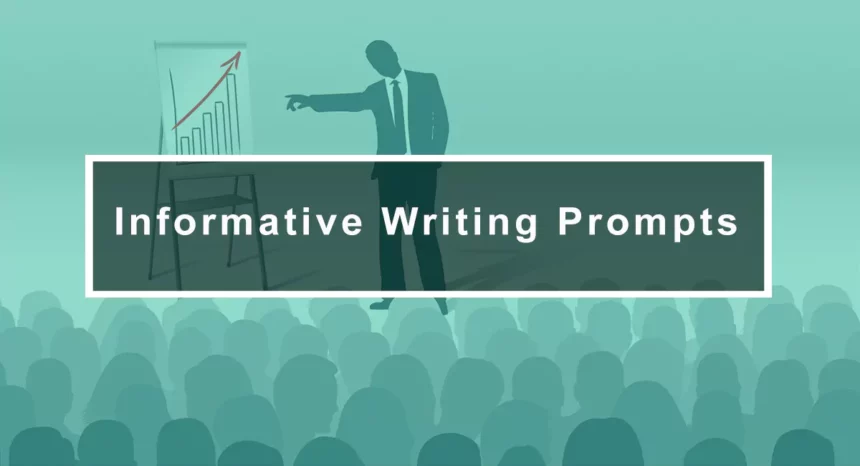
In an age saturated with information, the art of presenting facts, details, and knowledge in an engaging manner becomes increasingly vital. Informative writing prompts act as a bridge, guiding writers to dive deep into subjects, fostering understanding, and presenting it in an enlightening and coherent manner.
Here are 55 informative writing prompts designed to inspire detailed and educational compositions:
- Detail the impact of renewable energy sources on global warming.
- Explore the history and significance of the Mona Lisa.
- Outline the process of chocolate production from bean to bar.
- Discuss the consequences of deforestation on local ecosystems.
- Examine the cultural significance of the Great Wall of China.
- Describe the causes and effects of the stock market crash of 1929.
- Investigate the evolution of mobile communication technology.
- Highlight the role of women during World War II.
- Analyze the impacts of the digital age on traditional journalism.
- Dive into the history and development of the English language.
- Explain the journey of water through the hydrological cycle.
- Describe the process of photosynthesis and its importance.
- Unpack the political and historical significance of the Berlin Wall.
- Examine the origins and traditions of the Day of the Dead festival.
- Discuss the advancements in space exploration in the past decade.
- Explore the influence of Ancient Greek philosophy on modern thought.
- Detail the architectural marvels of the Roman Empire.
- Explain the significance of the Magna Carta in shaping constitutional law.
- Describe the life cycle of a monarch butterfly.
- Delve into the origins and practices of the Olympic Games.
- Outline the rise and impact of the Renaissance movement.
- Discuss the effects of social media on interpersonal relationships.
- Investigate the health benefits of a Mediterranean diet.
- Explore the history of jazz and its influence on contemporary music.
- Detail the construction and symbolism of Egyptian pyramids.
- Analyze the sociopolitical themes in George Orwell’s “1984”.
- Describe the progression and treatment of Alzheimer’s disease.
- Discuss the economic implications of cryptocurrency.
- Investigate the art and science of beekeeping.
- Explain the origins and practices of yoga and its health benefits.
- Describe the process of brewing beer.
- Dive into the cultural and historical significance of the Taj Mahal.
- Explore the foundational principles of quantum physics.
- Analyze the societal impacts of the Industrial Revolution.
- Detail the creation and functioning of the European Union.
- Discuss the biochemistry of human digestion.
- Investigate the art and technique of filmmaking.
- Delve into the origins and significance of the Samurai in Japanese culture.
- Discuss the causes and impacts of the 2008 global financial crisis.
- Analyze the importance of biodiversity in tropical rainforests.
- Explore the cultural and historical facets of African tribal art.
- Detail the evolution of women’s rights from the 19th century to now.
- Describe the formation and characteristics of coral reefs.
- Dive into the history and development of artificial intelligence.
- Examine the architectural wonders of Modernist Barcelona.
- Discuss the origins and effects of the human rights movement.
- Explore the techniques and importance of sustainable agriculture.
- Analyze the role and impact of the United Nations.
- Detail the artistry and cultural significance of ballet.
- Investigate the production and use of solar panels.
- Describe the journey of coffee cultivation and trade.
- Explore the mythology and stories of Ancient Norse culture.
- Detail the scientific basis and impacts of climate change.
- Discuss the traditions and celebrations of Hanukkah.
- Dive into the psychology and science behind dreams.
Conclusion:
From history to science, and culture to technology, these informative writing prompts provide a compass for navigating the vast oceans of knowledge. Whether for academic pursuits or personal growth, may these prompts inspire a journey of discovery, leading to clear, engaging, and impactful writing.
Sign Up For Daily Newsletter
Be keep up get the latest breaking news delivered straight to your inbox., leave a reply cancel reply.
Your email address will not be published. Required fields are marked *
Save my name, email, and website in this browser for the next time I comment.
SUBSCRIBE NOW
Subscribe to our newsletter to get our newest articles instantly!
30 Captivating March Writing Prompts
50 inspiring poetry writing prompts.
Poetry, a canvas for the soul, invites us to explore the depth of human emotions …

35 Deep Writing Prompts for Profound Reflections
In the realm of creative expression, delving deep into the complexities of existence, human nature, …

30 Engaging Dialogue Writing Prompts
In the realm of storytelling, dialogues breathe life into characters, giving them depth, personality, and …
Sign in to your account
Username or Email Address
Remember Me

25 Informative Essay Writing Prompts for the Secondary ELA Classroom
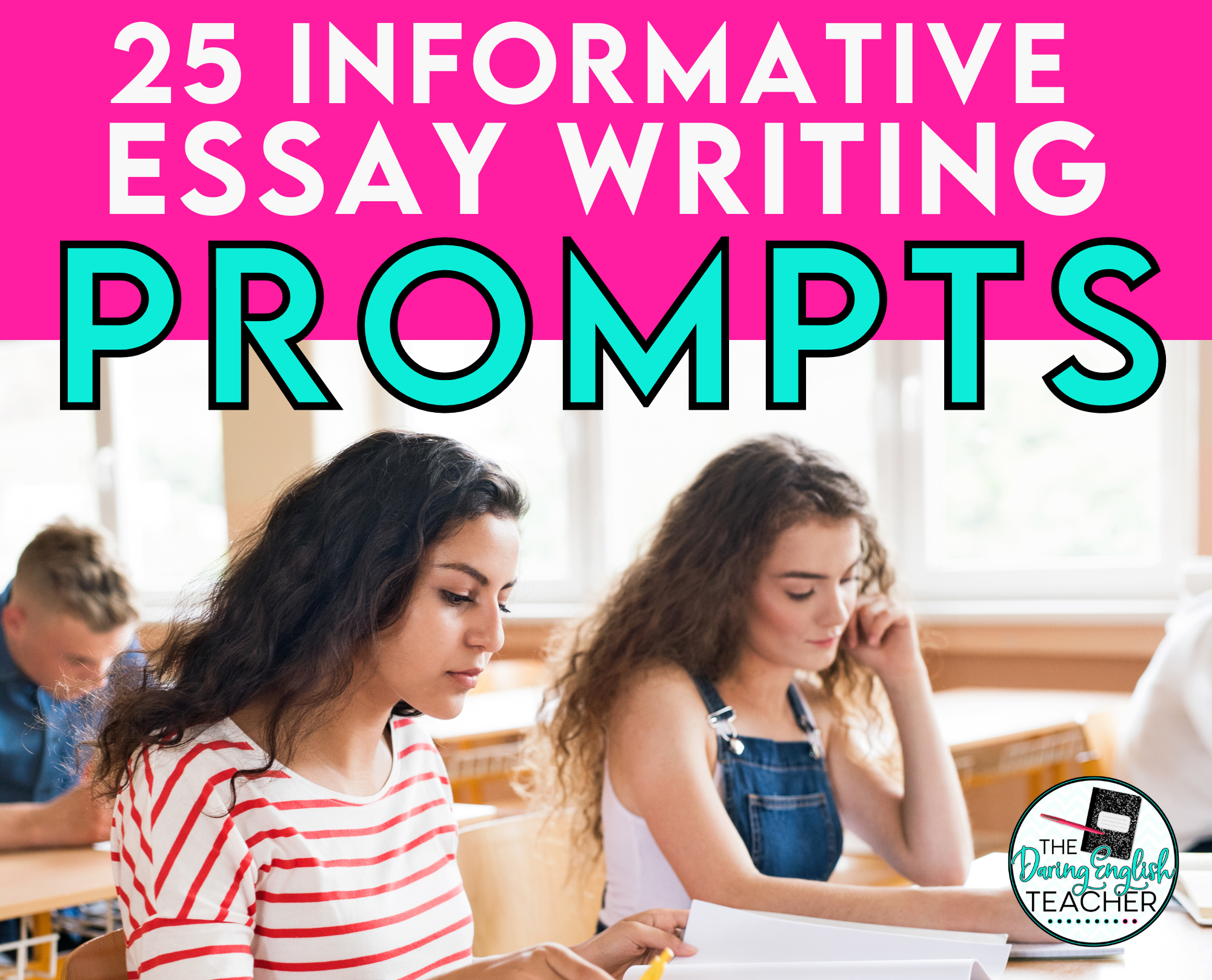
Looking for informative essay writing prompts? I’ve got you covered!
An informative essay is a staple in middle school ELA and high school English classrooms. An informative essay is a type of writing meant to inform the reader about a specific topic. Informative essays are based on facts and evidence and are not meant to persuade or argue a particular point of view.
When I teach informative essay writing to my students, I specify that essays should all be in one tense and written entirely in the third person. To help my students keep their writing in the third person, I like to use this Writing Spotlight: Writing in the Third Person mini-unit alongside my Informational Essay Writing Unit .
I’ve got you covered if you are looking for informational, informative, or explanatory writing prompts to use in your classroom!
Here are 25 informative essay writing prompts to get you started.
- Write an informational essay about the history and significance of a major world event (e.g. the fall of the Berlin Wall, the first moon landing)
- Write an informational essay about the life and accomplishments of a significant historical figure (e.g. Albert Einstein, Mahatma Gandhi)
- Write an informational essay about the causes and effects of a major environmental issue (e.g. climate change, deforestation)
- Write an informational essay about self-driving cars,
- Write an informational essay about an endangered animal and its habitat.
- Write an informational essay about the development and impact of a major scientific or technological breakthrough (e.g. the invention of the internet, the discovery of antibiotics)
- Write an informational essay about the role and importance of a specific branch of government (e.g. the judicial branch, the executive branch)
- Write an informational essay about the effects of a natural disaster (e.g. an earthquake, a hurricane) on a specific community or region
- Write an informational essay about the history and significance of a major cultural movement (e.g. the Harlem Renaissance, the feminist movement)
- Write an informational essay about the impact of social media on communication and relationships
- Write an informational essay about the causes and effects of poverty in a specific region or country
- Write an informational essay about what makes someone a hero.
- Write an informational essay about the impact of globalization on the economy and culture of a specific country or region
- Write an informational essay about the causes and effects of obesity in the United States
- Write an informational essay about the effects of advertising on consumer behavior
- Write an informational essay about the effects of air pollution on human health and the environment
- Write an informational essay about the role and impact of the media in shaping public opinion
- Write an informational essay about three causes of social media addiction
- Write an informational essay about the causes and consequences of cyberbullying
- Write an informational essay about the impact of video games on mental health and social development
- Write an informational essay about how sugar affects the brain
- Write an informational essay about the history and significance of a major world landmark (e.g. the Great Wall of China, the Eiffel Tower)
- Write an informational essay about the role and impact of the arts in society
- Write an informational essay about the effects of music on the brain and behavior
- Write an informational essay about the impact of technology on the education system and learning.
I hope that you find these informative essay writing prompts helpful!
If you are looking for more writing prompts, be sure to check out these additional blog posts:
- 50 Argument Essay Prompts
- Growth Mindset Writing Prompts
- Back-to-School Writing Prompts
Informative Essay Teaching Unit
Engage your students in this informational and expository essay unit that will help them learn how to write academically! This explanatory, expository, and informational writing unit includes everything you need to teach informational and explanatory writing to your middle and high school students. Plus, all of the digital and print materials are included!
What teachers are saying:
⭐️⭐️⭐️⭐️⭐️ Extremely satisfied
“ This is a fantastic resource. The graphic organizers have been amazing for supporting my students as they write essays. The guide says it is for grades 7th through 10th, but I am working with my 6th graders on informative writing and I think these are great resources and tools for them too. Thank you!”
“ Amazing product. This has everything you need to strengthen your student’s writing skills. The Daring English Teacher’s Blog is what I recommend for all my new teacher friends so they can see what a quality lesson includes. The handouts are easy to follow, and slide decks are thoughtfully laid out.”
Leave a Reply Cancel reply
Your email address will not be published. Required fields are marked *
Save my name, email, and website in this browser for the next time I comment.

SUBSCRIBE NOW
- Grades 6-12
- School Leaders
FREE Poetry Worksheet Bundle! Perfect for National Poetry Month.
70+ Fascinating Informative Essay Topics for Kids and Teens
Tell them what you know.

Informative essays are a chance to show what you know. They’re all about informing the reader, without trying to persuade or offer an opinion. Informative writing can include how-to process essays, biographical writing, an in-depth analysis of a topic, research papers, or compare-and-contrast essays . Just remember to stick to the facts, and be clear and descriptive. These informative essay topics offer something for all interests and ages.
How-To Informative Essay Topics
Social studies informative essay topics, science informative essay topics, pop culture informative essay topics.
Teach your reader the steps or process to:
- Cook a recipe
- Set a table
- Make a quilt
- Change a tire
- Start a recycling program
- Play a game
- Build a birdhouse
- Plant a garden
- Make and care for a compost pile

- Care for an animal
- Start a business
- Catch a fish
- Tie a necktie
- Train for a marathon
- Prepare a campsite
- Make a campfire
- Clean a room
- Wrap a gift
- Plan a party
- Kick a bad habit
- Use social media responsibly
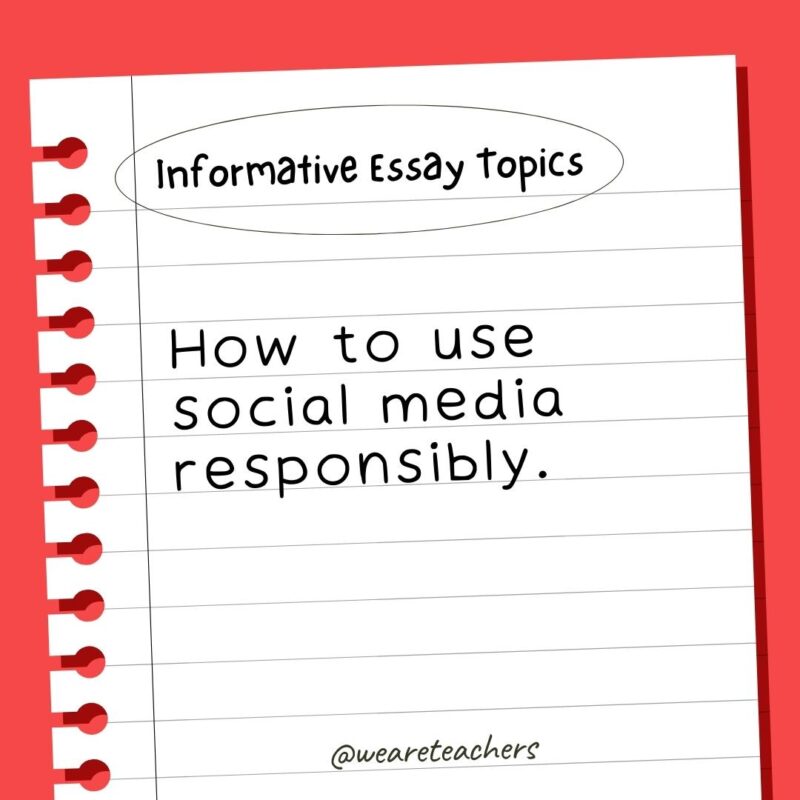
- Manage time effectively
- Make a budget
- Describe the life of a world leader.
- How has the role of women in the workplace changed in the last hundred years?
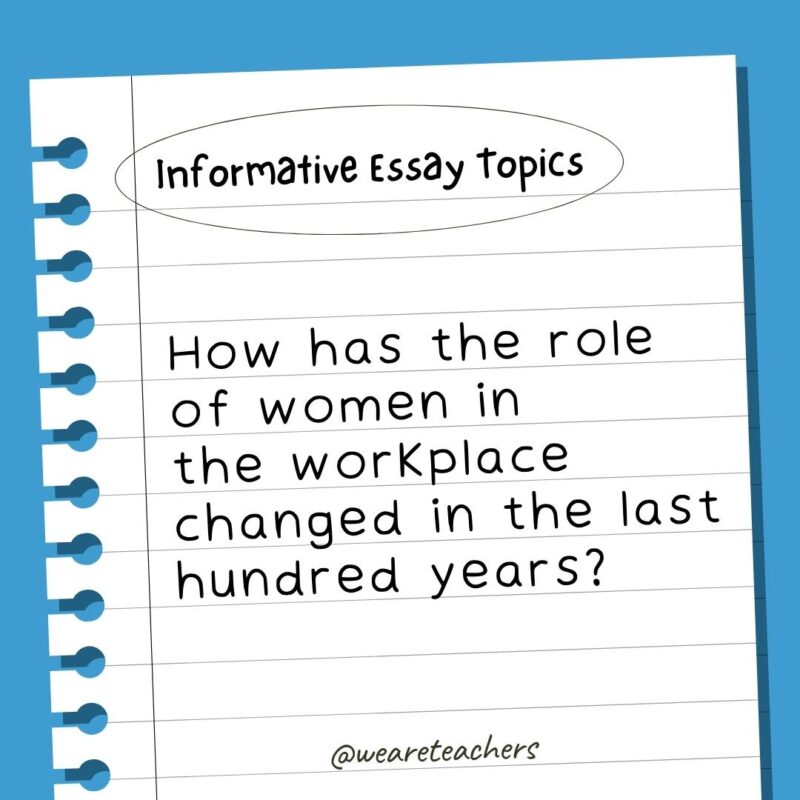
- Explore the current path to becoming an American citizen.
- What are some of the possible ways the pyramids were built?
- Describe a time period in history.
- How does one country’s economy affect another country?
- What is the difference between socialism and communism?
- Explore the benefits and drawbacks of legalizing drugs.
- Describe the political system in a foreign country.
- Explore the causes of a specific war or armed conflict in history.
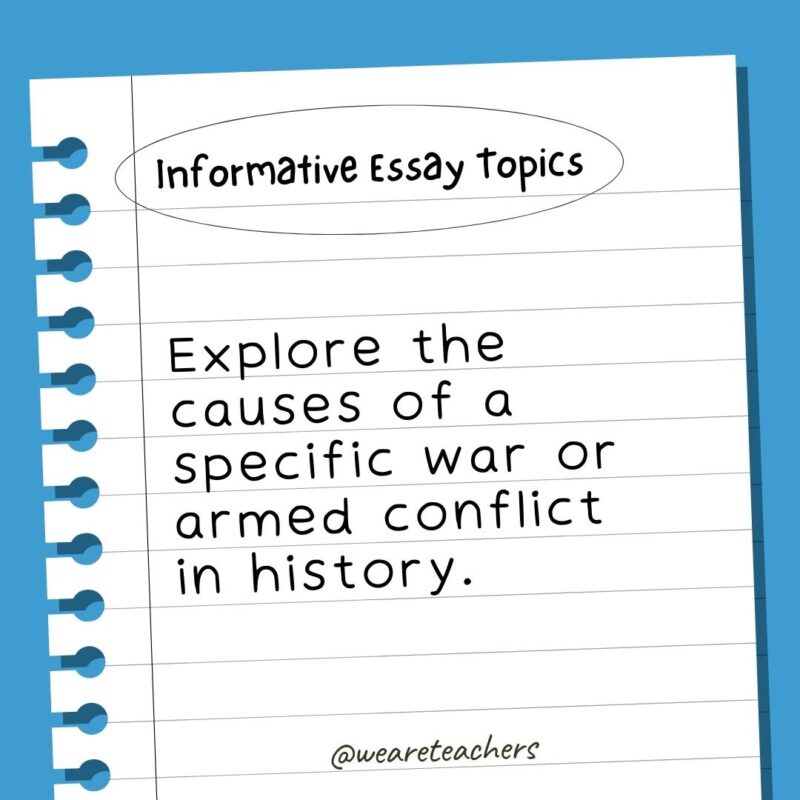
- How is a new law passed in the United States?
- Give an overview of the history of any country, state, or city.
- Describe the three branches of American government.
- Explain how the American judicial system works.
- Describe the evolution of fashion throughout history.
- Describe a science experiment, including the hypothesis, process, and conclusion.
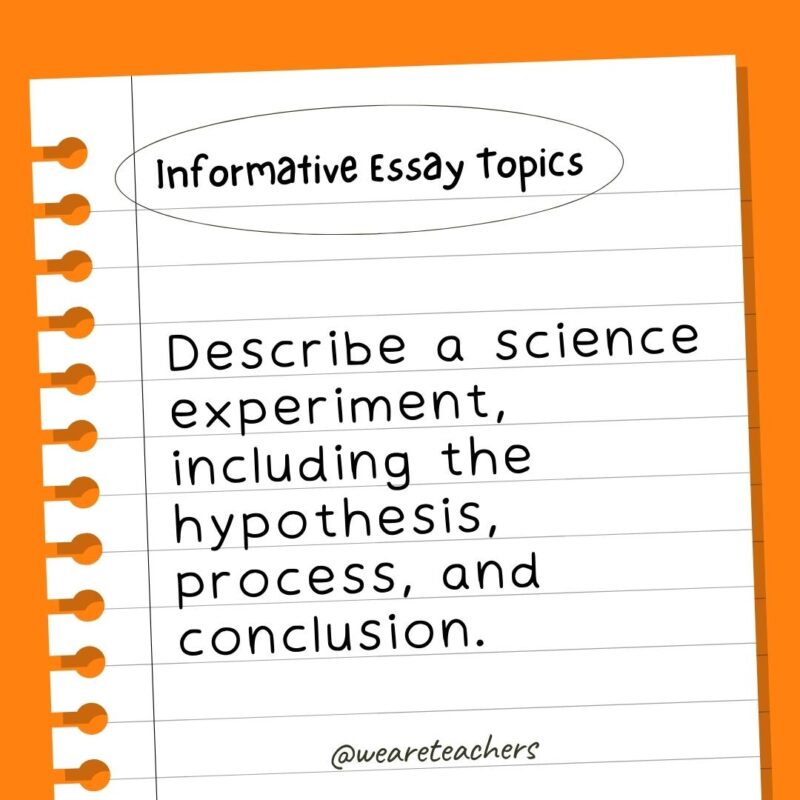
- Explain what it means to lead a healthy lifestyle.
- What is the relationship between calories and fat?
- What is the physics behind a bicycle?
- How do plants convert sunlight into energy?
- Describe any element from the periodic table, including its makeup and uses.
- What is the difference between a crocodile and an alligator?
- Describe the life cycle of any animal.
- What are the benefits of recycling?
- Describe the life of a prominent scientist.
- Explain what E = mc 2 means.
- Describe any disease, including its symptoms and treatments.
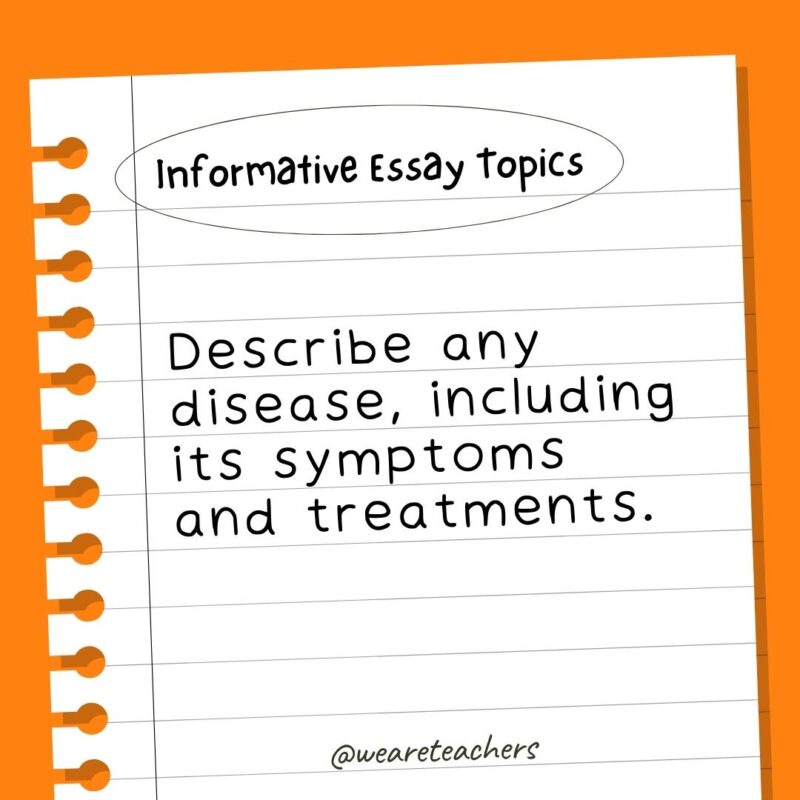
- Why do leaves change color in the fall?
- Explain the difference between climate and weather.
- Describe a specific ecosystem, including the plants and animals that live there.
- Describe the history of video games.
- What are recent trends in the video game industry?
- Describe your favorite superhero.
- Explain the motivations of any fictional villain.
- Describe the life of your favorite celebrity.
- Explore the development and growth of a main character in any book series.
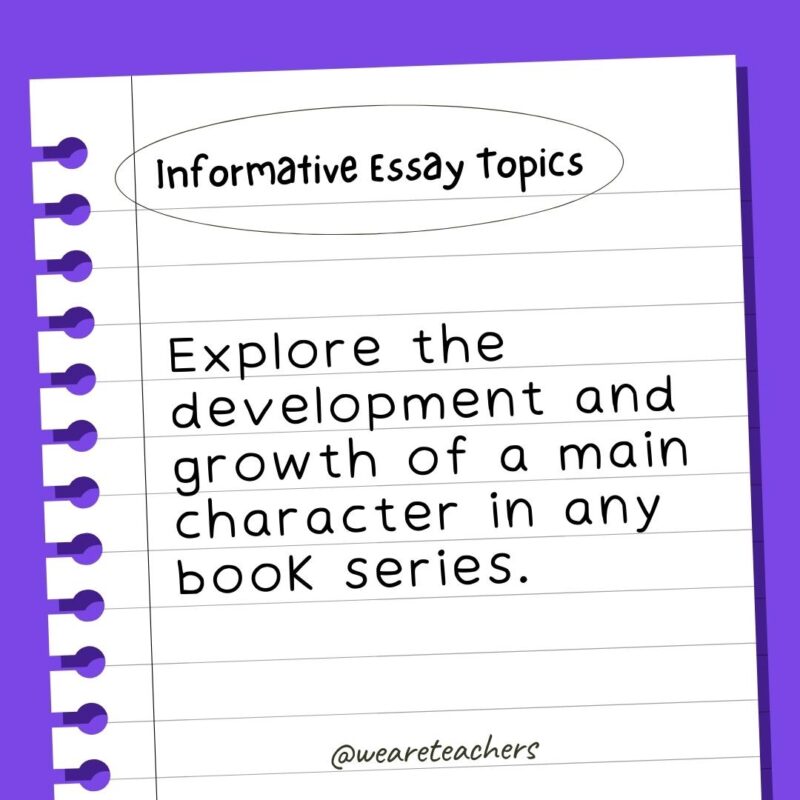
- Describe the process of making a movie or TV show.
- Tell the story of any band, including its founding, successes and challenges, and breakup (if applicable).
- Describe the life of a famous artist.
- Explore the history of Disney World (or any theme park).
- Plan the perfect fantasy football league team.
- Describe popular trends and fads from any decade.
- Explore the history of the Olympics.
- Describe the music of a generation and how it reflected that time.
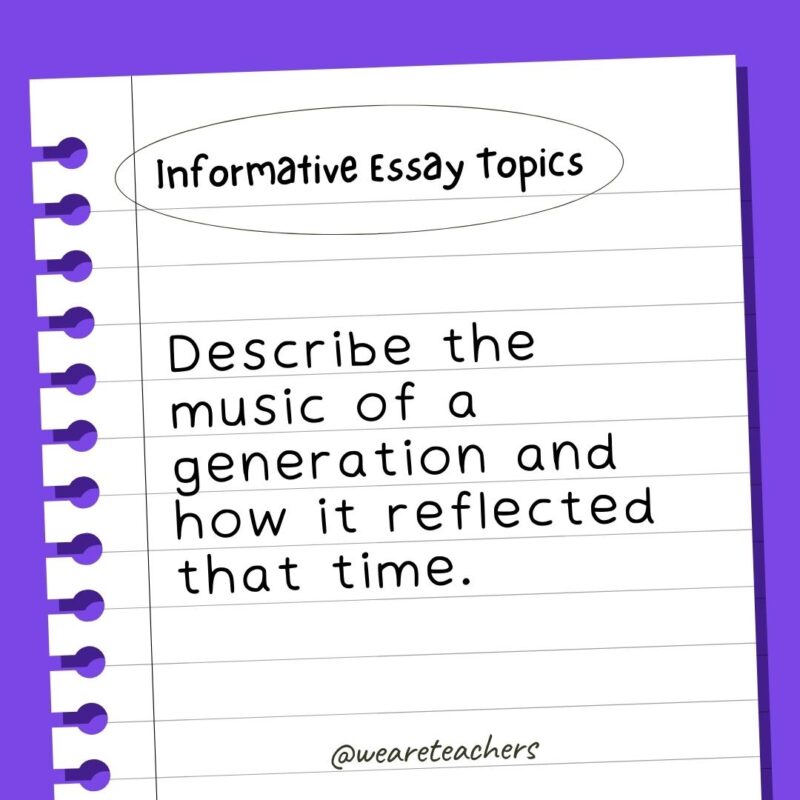
- Explain the history of the internet.
What are some of your favorite informative essay topics? Come share your ideas in the WeAreTeachers HELPLINE group on Facebook .
Plus, check out the big list of essay topics for high school (100+ ideas).
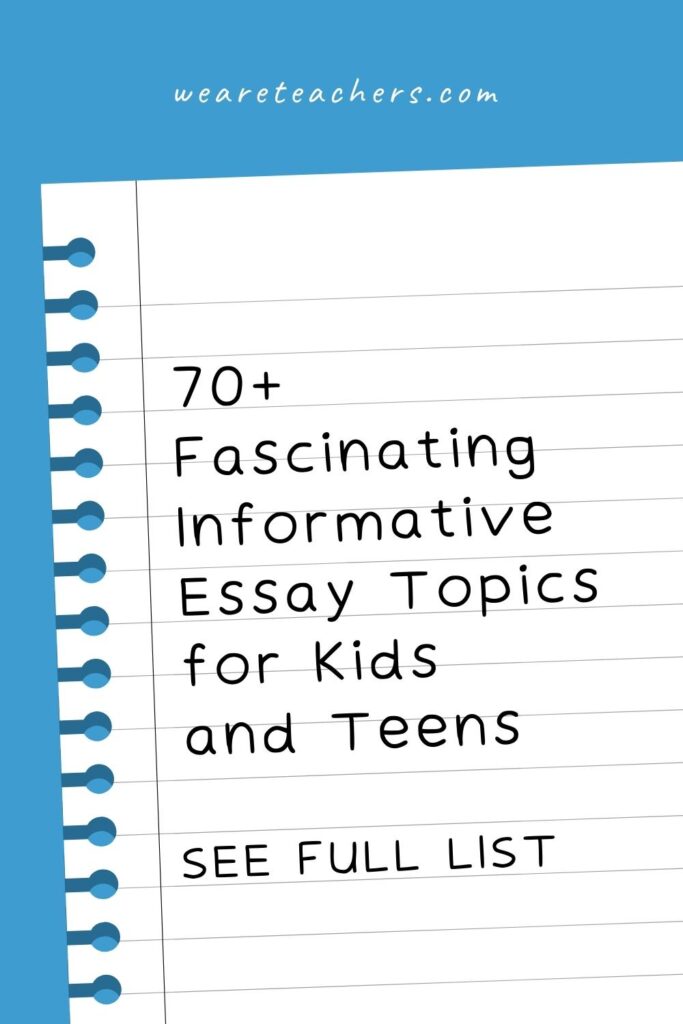
You Might Also Like

The Big List of Essay Topics for High School (120+ Ideas!)
Ideas to inspire every young writer! Continue Reading
Copyright © 2023. All rights reserved. 5335 Gate Parkway, Jacksonville, FL 32256
How to Write an Informative Essay: Everything You Need to Know

Did you know that informative essays aren't just for school? They're also used in jobs like journalism, marketing, and PR to explain complex ideas and promote things. This shows how useful they are outside of the classroom.
So, if you're planning to write one, that's a great choice! It's interesting but can be tough. To do it well, you need to plan, research, and organize carefully. Keep your tone balanced, give clear info, and add your own thoughts to stand out.
In this guide, our essay writer will give you tips on starting and organizing your essay effectively. At the end, you'll also find interesting essay samples. So, let's jump right into it.
What is an Informative Essay
To give a good informative essay definition, imagine them as windows to new knowledge. Their main job is to teach others about a particular topic. Whether it's for a school project or something you stumble upon online, these essays are packed with interesting facts and insights.
Here's a simple breakdown from our admission essay writing service of what makes an informative essay tick:

- Keeping It Real: These essays are all about the facts. No opinions allowed. We want to keep things fair and honest.
- Topics Galore: You can write about anything you find interesting, from science and history to things about different cultures.
- Where You Find Them: Informative essays can pop up anywhere, from your classroom assignments to the pages of magazines or even online articles.
- Research: Like a good detective, informative essays rely on solid evidence. That means digging into trustworthy sources to gather reliable information.
- Stay Neutral: To keep things fair, informative essays don't take sides. They present the facts and let readers draw their own conclusions.
- Structure: These essays have a clear roadmap. They start with an introduction to set the stage, then present the main points with evidence, and wrap up with a summary to tie it all together.
- Write for Your Audience: Keep your writing simple and easy to understand. Think about who will be reading it.
- Give Just Enough Detail: Don't overload people with info. Find the right balance so it's interesting but not overwhelming.
Ready to Ignite Minds with Your Informative Essay?
Our qualified writers are here to craft a masterpiece tailored to your needs worthy of an A+
Reasons to Write an Informative Essay
Writing informative essays, whether following the IEEE format or another style, is a great way to teach and share ideas with others. Here's why it's worth giving it a try:
.webp)
- Make Complex Ideas Easy : Informative essays simplify complicated topics so everyone can understand them. They break down big ideas into simple parts, helping more people learn and share knowledge.
- Encourage Thinking : When you read these essays, you're encouraged to think for yourself. They give you facts and evidence so you can form your own opinions about different topics. This helps you become better at understanding the world around you.
- Inspire Doing : They can motivate people to take action and make positive changes by raising awareness about important issues like the environment, fairness, or health. By reading these essays, people might be inspired to do something to help.
- Leave a Mark : When you write informative essays, you're leaving a legacy of knowledge for future generations. Your ideas can be read and learned from long after you're gone, helping others understand the world better.
How to Start an Informative Essay
If you're still doubting how to start with an informative essay outline, no worries! Here's a step-by-step guide to help you tackle this task like a pro. Alternatively, you can simply order essay and have it done by experts.

- Choose an Exciting Topic : Pick something that really grabs your attention. Writing about what you're genuinely interested in makes the whole process way more fun. Plus, it's easier to write confidently about things you know a bit about.
- Dig into Research : Spend some quality time digging up info from reliable sources. Take good notes, so you have all the facts you need to back up your essay. The better your research, the stronger your essay will be.
- Set Your Essay's Goal : Decide what you want your essay to do. Are you explaining something, analyzing a problem, or comparing ideas? Knowing your goal helps you focus your writing.
- Sketch Out Your Essay : Make a simple plan for your essay. Start with an intro that grabs attention and states your main idea. Then, map out your main points for the body paragraphs and plan a strong finish for your conclusion.
- Kick Off with an Awesome Introduction : Start with a killer opening line to hook your readers. Give a bit of background on your topic and clearly state your main idea.
- Flesh Out Your Body Paragraphs : In each paragraph, cover one key point backed up with evidence from your research. Keep it clear and simple, and don't forget to cite your sources.
- Wrap Up Strong : Sum up your main points in your conclusion and restate your main idea in a memorable way. Leave your readers with something to think about related to your topic.
Informative Essay Outline
Many students don't realize how helpful outlining can be for writing an informative essay. Spending a bit of time on it can actually save you loads of time later on when you're writing. To give you a head start, here's a simple format from our term paper writing services :
I. Introduction
- Start with something catchy to grab attention
- Give a little background info on your topic
- State your main idea clearly in your thesis statement
II. Body Paragraphs
A. Talk about your first main idea
- Share evidence or facts that support this idea
- Explain what the evidence means
- Transition smoothly to the next point
B. Move on to your second main idea
- Provide evidence or facts for this point
- Explain why this evidence matters
- Transition to the next paragraph
C. Address your third main idea
- Offer supporting evidence or facts
- Explain the significance of this evidence
- Transition to the next part
III. Conclusion
- Restate your thesis statement to remind readers of your main point
- Summarize the key points you've covered in the body paragraphs
- Leave readers with some final thoughts or reflections to ponder
IV. Optional: Extra Sections
- Consider addressing counterarguments and explaining why they're not valid (if needed)
- Offer suggestions for further research or additional reading
- Share personal anecdotes or examples to make your essay more relatable (if it fits)

Informative Essay Structure
Now that you've got a plan and know how to start an essay let's talk about how to organize it in more detail.
Introduction :
In your informative essay introduction, your aim is to grab the reader's interest and provide a bit of background on your topic. Start with something attention-grabbing, like a surprising fact or a thought-provoking question. Then, give a quick overview of what you'll be talking about in your essay with a clear thesis statement that tells the reader what your main points will be.
Body Paragraphs:
The body paragraphs of an informative essay should dive into the main ideas of your topic. Aim for at least three main points and back them up with evidence from reliable sources. Remember the 'C-E-E' formula: Claim, Evidence, Explanation. Start each paragraph with a clear point, then provide evidence to support it, and finally, explain why it's important. Mastering how to write an informative essay also requires smooth transitions from one section to the next, so don't forget to use transition words.
Conclusion :
You may already guess how to write a conclusion for an informative essay, as it's quite similar to other writing types. Wrap up by summarizing the main points you've made. Restate your thesis to remind the reader what your essay was all about. Then, leave them with some final thoughts or reflections to think about. Maybe suggest why your topic is important or what people can learn from it.

Informative Essay Examples
Essay examples show how theoretical ideas can be applied effectively and engagingly. So, let's check them out for good structure, organization, and presentation techniques.
Additionally, you can also explore essay writing apps that offer convenience and flexibility, allowing you to work on assignments wherever you are.
7 Steps for Writing an Informative Essay
Before you leave, here are 7 simple yet crucial steps for writing an informative essay. Make sure to incorporate them into your writing process:
.webp)
- Choose Your Topic: If you're given the freedom to choose your topic, opt for something you're passionate about and can explain effectively in about five paragraphs. Begin with a broad subject area and gradually narrow it down to a specific topic. Consider conducting preliminary research to ensure there's enough information available to support your essay.
- Do Your Research: Dive deep into your chosen topic and gather information from reliable sources. Ensure that the sources you use are credible and can be referenced in your essay. This step is crucial for building a solid foundation of knowledge on your topic.
- Create an Outline: Once you've collected your research, organize your thoughts by creating an outline. Think of it as a roadmap for your essay, briefly summarizing what each paragraph will cover. This step helps maintain coherence and ensures that you cover all essential points in your essay.
- Start Writing: With your outline in hand, begin drafting your essay. Don't strive for perfection on the first attempt; instead, focus on getting your ideas down on paper. Maintain an objective and informative tone, avoiding overly complex language or unnecessary embellishments.
- Revise Your Draft: After completing the initial draft, take a break before revisiting your work. Read through your essay carefully, assessing how well your arguments are supported by evidence and ensuring a smooth flow of ideas. Rewrite any sections that require improvement to strengthen your essay's overall coherence and clarity.
- Proofread: Once you've revised your essay, thoroughly proofread it to catch any spelling or grammar errors. Additionally, verify the accuracy of the facts and information presented in your essay. A polished and error-free essay reflects positively on your attention to detail and credibility as a writer.
- Cite Your Sources: Finally, include a citations page to acknowledge the sources you've referenced in your essay. Follow the formatting guidelines of the chosen citation style, whether it's MLA, APA, or Chicago, to ensure consistency and proper credit to the original authors. This step is essential for maintaining academic integrity and avoiding plagiarism accusations.
Final Remarks
Fantastic! Now that you know how to write an informative essay and absorbed the essentials, let's recap the key points:
- You've learned the basics of informative essay writing.
- Ready to choose an interesting topic that connects with your audience.
- You've understood how to organize your essay clearly, with each paragraph serving a purpose.
- You have step-by-step guidance for writing engagingly.
- You've gained valuable tips to improve your writing skills and make your essay stand out.
By applying these insights, you're set to write an engaging essay that informs and inspires your readers!
Want to Unleash the Brilliance of Your Ideas?
Claim your expertly crafted informative essay today and command attention with your brilliant insights!
Related Articles
.webp)
Jump to navigation
- Inside Writing
- Teacher's Guides
- Student Models
- Writing Topics
- Minilessons
- Shopping Cart
- Inside Grammar
- Grammar Adventures
- CCSS Correlations
- Infographics
Get a free Grammar Adventure! Choose a single Adventure and add coupon code ADVENTURE during checkout. (All-Adventure licenses aren’t included.)
Sign up or login to use the bookmarking feature.
15 Engaging Explanatory Writing Prompts
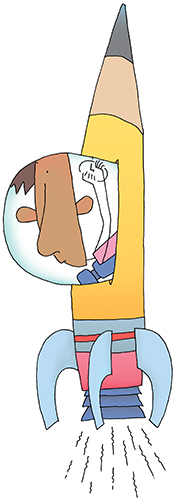
When you want your students to practice explanatory writing, present them with one or more of the following prompts, grouped by difficulty. You can also introduce students to the PAST strategy to help them understand what each explanatory prompt is asking them to do.
Beginning Explanatory Prompts (Grades 4–5)
The following explanatory prompts are meant for students who are moving from paragraph writing to essay writing.
1. Defining Friendship
Everyone needs friends. What qualities make someone a good friend? How can you be a friend for someone who needs one? Write an essay that explains ways to be a good friend.
2. A Job for Me
People do all kinds of jobs. Some people build. Others serve. Some teach. Others sell. Some people work on ships at sea, and others in skyscrapers in cities. What kind of job would you like to do? As a future worker, write an essay that names a job you would like, describes the work, and tells why you would like it.
3. An Admirable Person
We all have people we admire. They might be family members or friends. They might be singers, dancers, or actors. They might even be fictional characters. Whom do you admire most? Write an essay that names a person you admire and describes the qualities that make you like the person.
4. Sweet or Spicy?
Most people have a favorite food. What is yours? Is the food a common one that most other kids would know about, or a really special type? Is it sweet or spicy? In an essay, name your favorite food and describe to your classmates how it looks, smells, and tastes. Tell why you like it so much.
5. My Ideal Home
Most people can imagine a dream home. What would yours be? Big or small? In the country or in the city? How many floors? Would it be underground or up in a tree? As a young person, write an essay describing your dream home to a parent or guardian.
Intermediate Explanatory Prompts (Grades 6–8)
The following explanatory prompts are meant for students who do regular multi-paragraph writing.
6. Connectivity Culture
Smartphones, tablet PCs, social media, and constant connectivity are changing the ways that people live, think, work, and connect. How do these technologies shape your life? Are you plugged in or tuned out? Why? Write an essay that explains to your fellow students the ways that you connect digitally and predicts how people will connect in the future.
7. Pets vs. People
Pets are not people. After all, dogs don’t go to school and cats don’t hold down jobs. But pet owners often consider their dogs and cats to be members of their families. In what ways are pets like people and in what ways are they not? Write a comparison-contrast essay explaining the similarities and differences between pets and people.
8. Defining Responsibility
A parent is responsible for taking care of children. A criminal is responsible for committing a crime. And teens are encouraged to make responsible choices. Just what does it mean to be “responsible”? Does it mean something different for young people than for adults? As a young person who is taking on more and more responsibilities, write an essay that defines what responsibility means to you, and explain the idea to those older than you.
9. Unique Celebrations
The Chinese celebrate New Year with a dragon dance. How do you celebrate New Year? What other special days do you observe? In an essay, explain a celebration or ritual that you know about. Tell what is usually done and why. Explain it to a reader who is new to the event.
10. Here's How It's Done
What are you really good at? Perhaps you can sink a free throw every time. Maybe you can identify birds by their songs, or make a very delicious homemade pizza. Think of a particular skill you have and could teach others. Then write an essay describing the process you use to accomplish this special feat. Provide enough detail so your reader can learn how to do the same thing.
Advanced Explanatory Prompts (Grades 9–12)
The following prompts are meant for high-school level writers. Students may need to research the topics in order to respond with sufficient depth and complexity.
11. Addressing Cyberbullying
Cyberbullying involves using technology to harm, intimidate, and embarrass others. One form of cyberbullying called “trolling” occurs when anonymous Internet users intentionally post inflammatory content in an attempt to provoke and upset other users. While much effort has been made to counteract bullying in schools, the online and anonymous nature of cyberbullying makes it difficult to regulate. Write an essay that explains to your fellow students ways to counteract cyberbullying.
12. Moral Dilemmas
Consider a moral dilemma that a character in a novel or other piece of literature must face. It could be an issue you yourself have faced or one that is new to you. Explain what you would do if you were caught in the same situation. Then explain why you would handle it that way.
13. Talking About My Generation
Today’s youth are sometimes perceived as tech savvy, optimistic, and accepting. Other times, they are perceived as spoiled, coddled, and lazy, more interested in checking Instagram than in bearing down and working hard. In an essay, define the general characteristics of your generation. Provide evidence and reasons to support your definition.
14. Fashionable Expressions
Author Sarah MacLean believes “The most confident of women are those who believe in every scrap of fabric they wear.” Indeed, clothing is a form of self-expression for many people. Evaluate the clothing choices that you or someone else (famous or not) makes and explain what these fashion choices express about the person.
15. Comparing Future Career Paths
What do you want to do after you graduate from high school? Attend college? Hone your skills at a trade school? Or go straight into the professional world? Choose two options (college, trade school, job) and write an essay in which you analyze similarities and differences between the two options.
Teacher Support:
Click to find out more about this resource.
Standards Correlations:
The State Standards provide a way to evaluate your students' performance.
- 110.5.b.12.B
- LAFS.3.W.1.2
- 110.6.b.11.B
- 110.6.b.12.B
- LAFS.4.W.1.2
- 110.7.b.12.B
- LAFS.5.W.1.2
- 110.22.b.10
- 110.22.b.11.B
- LAFS.6.W.1.2
- 110.23.b.10
- 110.23.b.11.B
- LAFS.7.W.1.2
- 110.24.b.10
- 110.24.b.11.B
- LAFS.8.W.1.2
- 110.36.c.10.B
- LAFS.910.W.1.2
- 110.38.c.10.B
- 110.39.c.10.B
- LAFS.1112.W.1.2
- LA 12.2.1.b
- LA 12.2.2.a
Related Resources
All resources.
- What are the keys to successful project-based programs?
- How can students use Inquire for PBL?
- How can students share what they find?
- Where can I see PBL in action?
- 38 Ways Students Can Create Digital Content
- Writing Character Analyses
- Writing Literary Analyses
- Inquire Online Middle School Classroom Set
- Inquire Online Middle School Teacher's Guide
- Write on Course 20-20
- Inquire Middle School Teacher's Guide
- Inquire Middle School
- Inquire Elementary Teacher's Guide
- Inquire Elementary
Search the blog
Input your search keywords and press Enter.
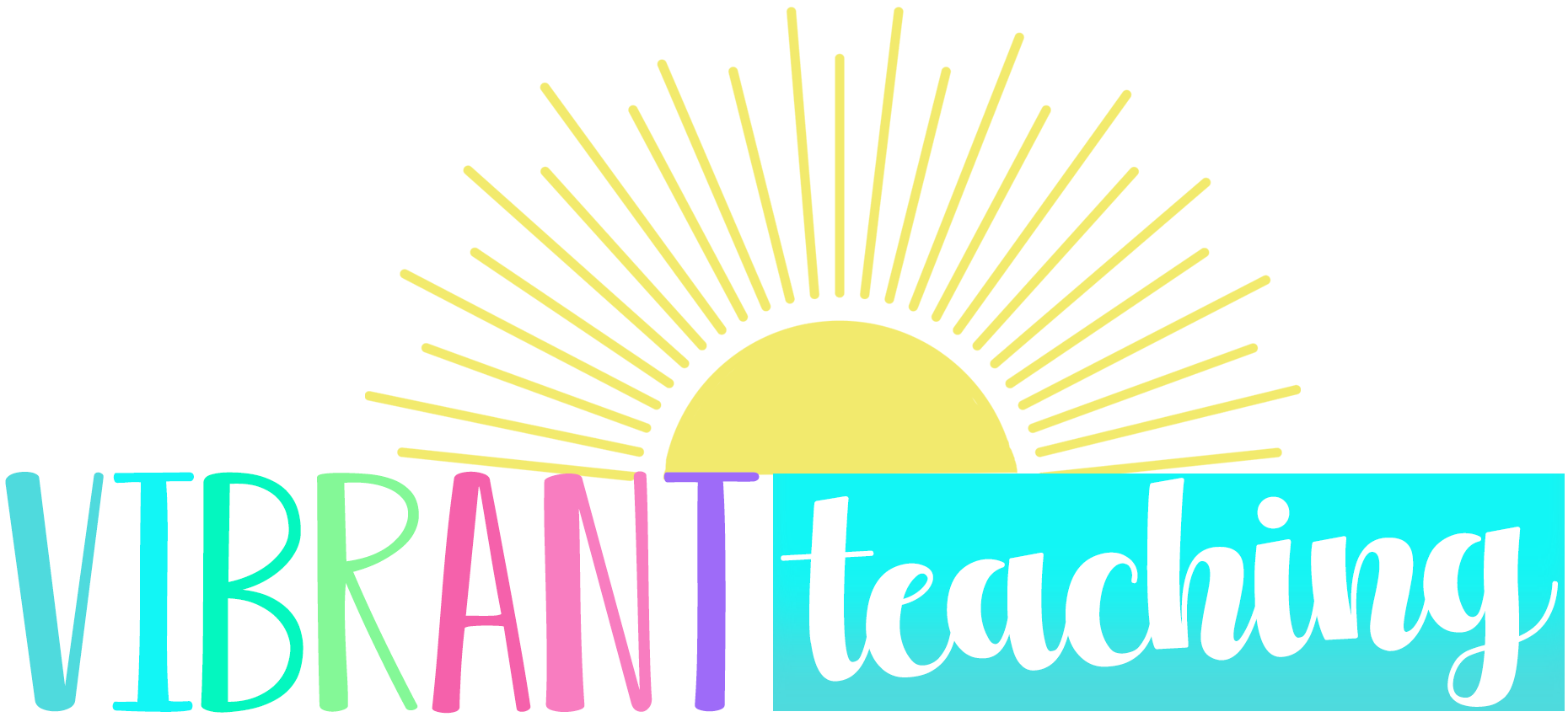
Vibrant Teaching
Teaching Resources Creator and Blogger
20 Prompts for Information Writing That Empower Students
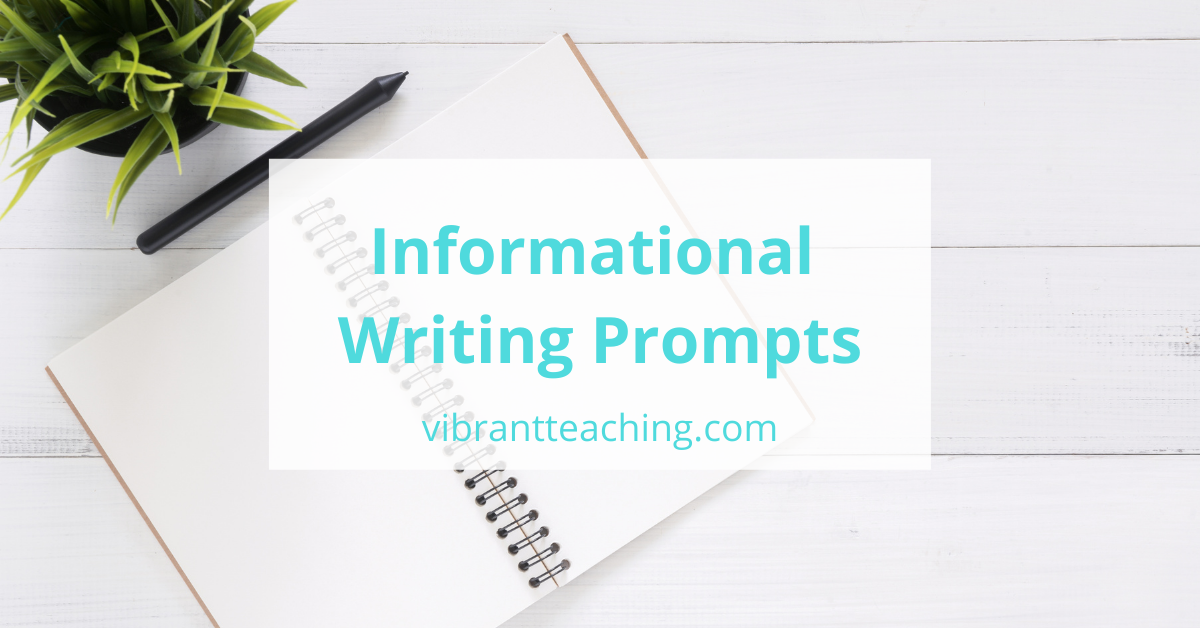
Information writing enables kids to become the expert. They develop skills to inform and teach about a particular topic. Writing prompts are beneficial because they motivate students and help generate ideas. Read on to learn more about mentor texts, ideas, and assessments. Plus you will find 20 informational writing prompts that empower students.
Definition of Informational Writing
Informational writing uses facts to teach about a topic. The main purpose is to inform or explain. This type of non-fiction writing includes text features such as table of contents, headings, captions, diagrams, glossary, and index.
Example of Informational Writing
There are many forms of information writing. It’s beneficial to immerse students in the genre during a unit. Mentor texts can be used when teaching a mini-lesson to model skills and strategies. These books are also helpful as a reference tool for students during writing time. Below is a list of mentor texts to try out in the classroom.
Information Writing Mentor Texts:
- National Geographic Kids Books
- Let’s Read and Find Out Books
- Who Was/Who Is Book Series
- Who Would Win? Book Series
- Gail Gibbons Books
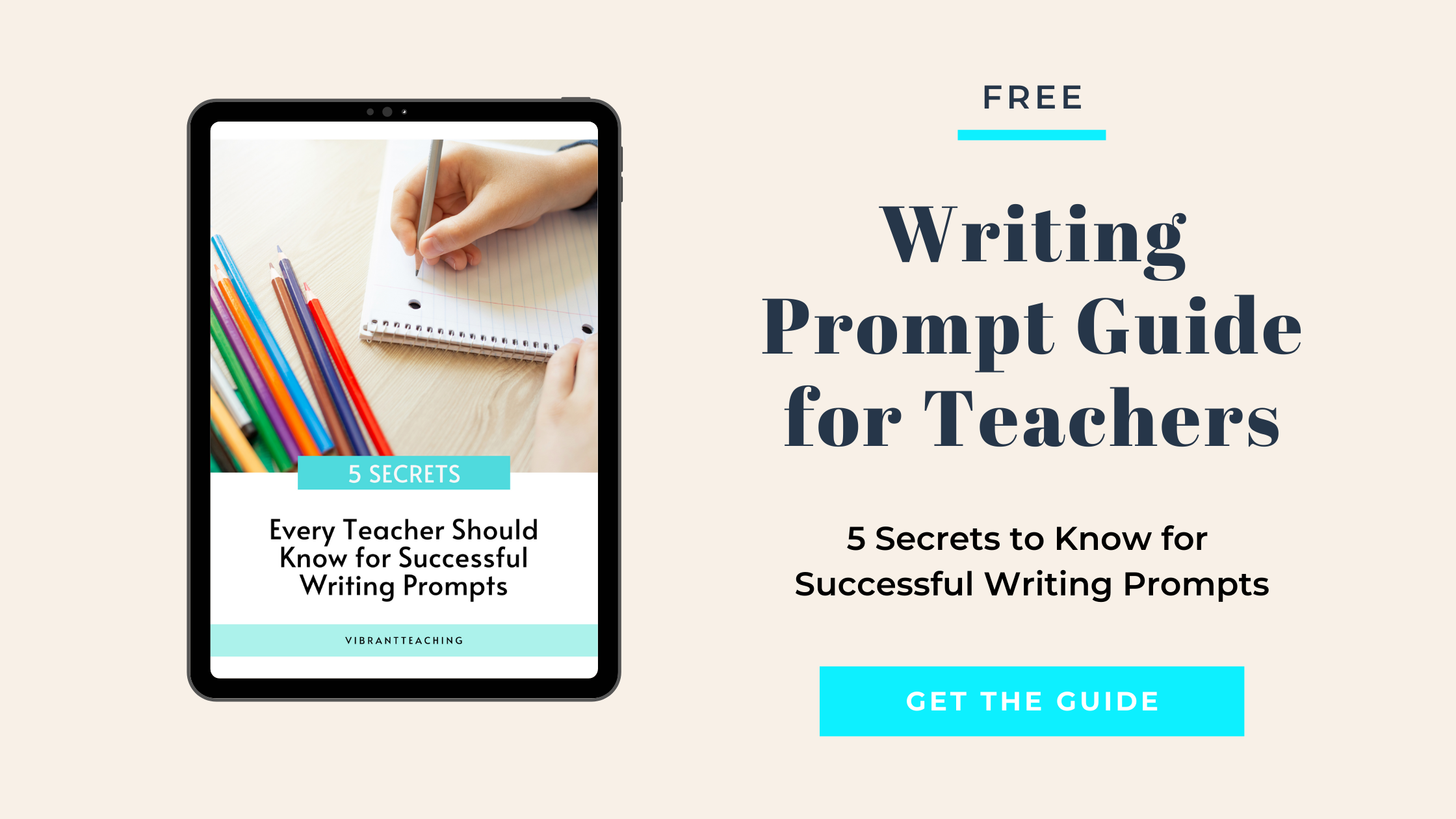
How to Teach Information Writing
1. brainstorm expert topics:.
Students will brainstorm ideas and choose one topic they know a lot about and can be an expert on. Some ideas include a sport, animal, or hobby. Students may even want to discuss ideas at home before choosing a topic.
2. Write Ideas on Paper:
After writers choose a topic, they need to get ideas down on paper. I often have kids do a brain dump. The class sets a timer and students write down everything they know about their topic. It doesn’t have to be organized or look pretty because the content is what matters. This is also a chance for students to see if they have enough information. However, they may need to choose a new topic or do additional research.
3. Organize Ideas:
Students will take their topic and break it down into smaller more focused sections. Each of these sections may become a separate paragraph or chapter later on. Writers can organize this information by saying their topic and touching the palm of their hand. After that, they can list the smaller ideas across their fingers.
4. Create Information Writing:
After all of the planning and preparation, students are ready to start their informational writing piece. There are many different text features that can enhance the writing. Check out the list below.
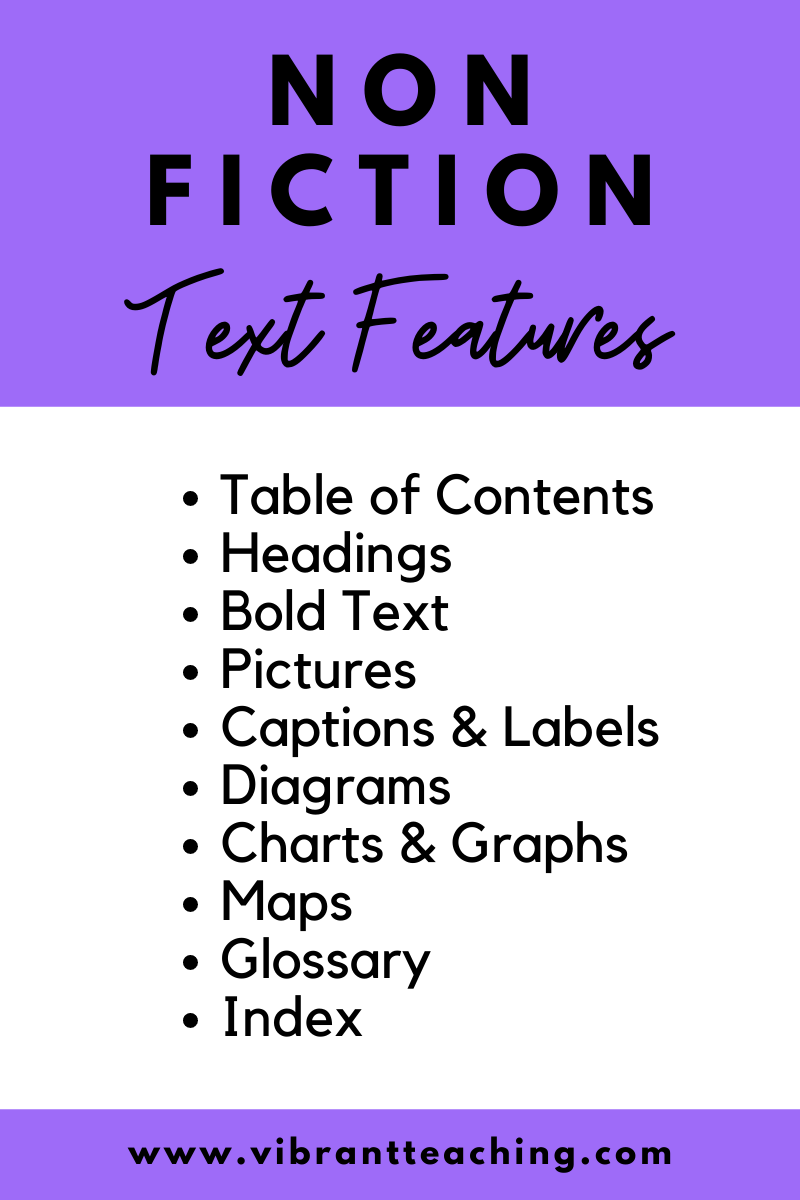
5. Complete Final Copy (optional):
Students can work independently, with a partner, or with the teacher to edit and revise their writing. Checklists and rubrics (see the rubrics section below) are always helpful guides. Most importantly, students should check their work to make sure it contains facts and information instead of opinions.
I like to provide different types of writing paper that match the text features. There are separate pages for the table of contents, glossary, and index. It’s also helpful to have different options of paper with lines and boxes. These picture boxes can show diagrams, charts, graphs, and maps.
Topics for Informational Writing
There are so many great topics for information writing that will enable kids to become the expert. Students can choose something they do really well or know a lot about. Writing prompts effectively help kids generate ideas and get the creative juices flowing more quickly. The list below has 20 empowering prompts that students will love! Also, check out this blog post to learn more about opinion writing prompts: 20 Prompts for Opinion Writing That Motivate Kids
Informational Writing Prompts:
- Choose a pet such as a dog, cat, fish, or hamster. After that, explain how to take care of this pet.
- Imagine someone has never played your favorite game. Explain the steps so they can learn how to play.
- Where could your class go for the best field trip? Choose a place and explain what it has to offer.
- It’s important to keep our Earth clean. Explain 3 or more ways someone can do their part to help the Earth.
- What would it be like to run the school for a day? Explain 3 big changes you would make to your school.
- Explain how to cook or bake your favorite food. Be sure to include some helpful tips.
- Choose a job that’s important and explain what they do at work.
- Compare and contrast the seasons of Summer and Winter. What do they have in common? What makes them so different?
- Explain what you do to get ready in the morning on a school day.
- What kinds of things could you do to cheer someone up if they are sad? Give specific examples.
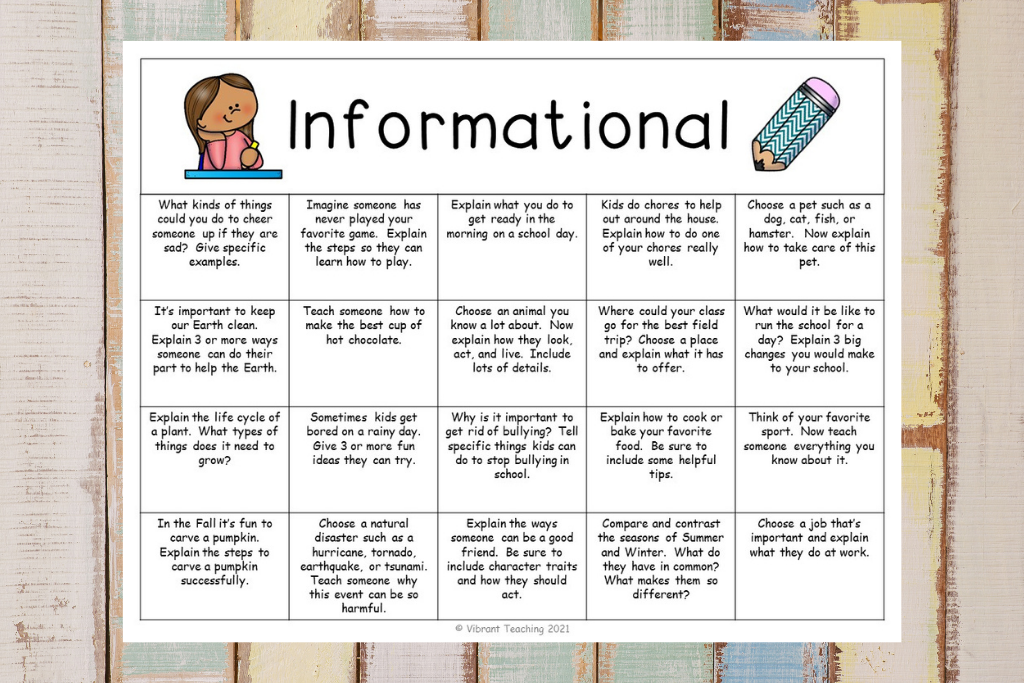
Prompts Continued . . .
- Kids do chores to help out around the house. Explain how to do one of your chores really well.
- Teach someone how to make the best cup of hot chocolate.
- Choose an animal you know a lot about. After that, explain how they look, act, and live. Include lots of details.
- Explain the life cycle of a plant. What types of things does it need to grow?
- Sometimes kids get bored on a rainy day. Give 3 or more fun ideas they can try.
- Why is it important to get rid of bullying? Tell specific things kids can do to stop bullying in school.
- Think of your favorite sport. Now teach someone everything you know about it.
- In the Fall it’s fun to carve a pumpkin. Explain the steps to carve a pumpkin successfully.
- Explain the ways someone can be a good friend. Be sure to include character traits and how they should act.
- Choose a natural disaster such as a hurricane, tornado, earthquake, or tsunami. Teach someone why this event can be so harmful.
Information Writing Rubrics
Rubrics are a helpful resource for both teachers and students. Teachers can ensure accuracy by using rubrics aligned with the standards. Then these assessments can be used for benchmarks, progress reports, report cards, and conferences. Students can benefit by looking at rubrics beforehand to understand expectations and set goals.
Below you will find three types of informational writing rubrics for various grade levels. Each rubric is aligned with the Common Core Standards and has different benefits depending on your needs. Check out this blog post to learn more about student-friendly, teacher-friendly, and time-saving rubrics: 3 Types of Writing Rubrics for Effective Assessments

Information Writing Conclusion
In conclusion, information writing enables students to become the teacher. This really empowers kids and motivates them to do their best writing so they can teach others. One of the best ways to get students engaged and eager to write is by using writing prompts. Writing prompts are perfect for morning work, writing time, centers, or as a homework assignment. Above all, they will save you lots of valuable time and energy. Did you grab your Free Writing Prompt Guide yet? Click the link to get started!
Genre Based Prompts
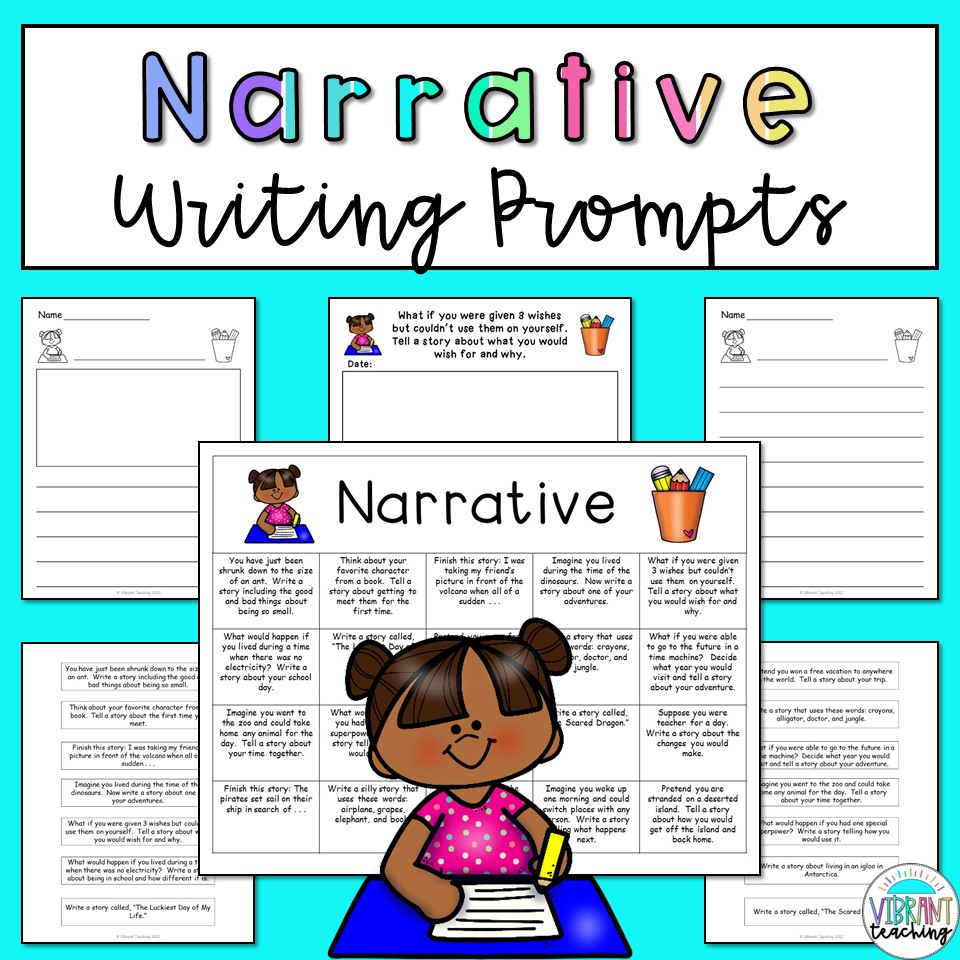
Related Articles:
- 20 Prompts for Narrative Writing That Spark Creativity
- 20 Prompts for Opinion Writing That Motivate Kids
- Informational Writing for Kids: Videos
- Informative Writing in the Classroom, Grades 3-12
Angela Sutton
Related posts.
3 Types of Writing Rubrics for Effective Assessments
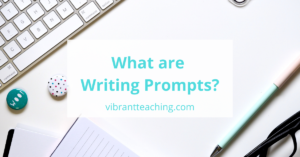
What are Writing Prompts? A Helpful Guide for Teachers

Back to School Writing Ideas for Kids
No comments, leave a reply cancel reply.
I accept the Privacy Policy

I specialize in helping elementary teachers with writing resources, tips, and ideas. My goal is to save teachers time and energy so they can be vibrant inside and outside of the classroom! Read More
SEARCH THE BLOG
Subscribe to our mailing list.
Get the news right in your inbox!
Health and Wellness

Opinion and Informational Text Sets: Reading and Writing from One Text Set (+ a Freebie)
This past year I have been wrapping up a project that has been quite the labor of love: Monthly Text Sets. The monthly text sets solve a list of problems I consistently ran into when teaching 4th Grade ELA. But first, what are the monthly text sets? The monthly text sets are a set of nonfiction passages based around one topic. Students use the passages/articles to write in response to reading. The text set includes an opinion or informational writing prompt and reading comprehension questions. This means that you can use ONE set of texts to teach both reading and writing.
What does each monthly text set include?
- 2 – 3 Nonfiction Passages based around one topic
- Comprehension Questions aligned to standards
- Writing Prompt for Opinion or Informational Text-based writing in response to reading
- Graphic Organizer for Students
- Teacher Model Graphic Organizer
- Teacher Model Essay
- Differentiated for Grades 3-5
Reading Comprehension
Each text set includes 2 – 3 passages/articles (texts). They are nonfiction topics and the texts are differentiated for grades 3-5. The 4th and 5th grade articles sometimes remain the same, but the questions are different for each grade level. The questions follow the type of questions students might see on a state test such as the Florida State Assessment, and are aligned to the Common Core State Standards. Even if your state doesn’t exactly follow common core standards and they have their own, the questions are based on skills as well such as main idea, text structure, cause and effect, etc.

You can see examples of the question types below. Each grade level is included. I kept it this way so that even if you teach another grade level, you can differentiate for your students if needed. Don’t forget to grab this free shark text set before you go! Click here or on any of the images.
3rd Grade Reading Comprehension

4th Grade Reading Comprehension

5th Grade Reading Comprehension

You will also get a link that gives you access to the Standards Alignment Google Sheet. This way you can keep track of which standards each text set is covering. If you wanted to cover a specific skill, you have an easy way to track and access which standards are covered in which text set.
The writing portion includes a prompt in which students will write using both texts to respond. The prompt for this text set is an informational writing prompt:
Write an essay in which you explain the importance of sharks in the ocean ecosystem.

If you are familiar with my writing units, then you know that boxes and bullets are the standard around here. I have a lot of thoughts about that, but the gist is that they are so simple and provide a consistent structure for your students. Each text set includes a boxes and bullets graphic organizer for students and a teacher example to model or guide your students. Depending on where you are in your writing instruction, you can also have students do this in their notebook.

Writing paper is also included for a final published piece. Depending on how long you have and/or if you are in test-prep mode, you may choose to have students write a rough draft on notebook paper or in their writing notebook and then write a final copy on the publishing paper. Then, display in your classroom or hallway for the world to see all of your students’ amazing writing!
The plan and example essay includes 2-3 body paragraphs. So your students will be writing 4 – 5 paragraph essays. Depending on which you prefer to have your students write, you’ll just add/remove a body paragraph.
- Paragraph 1: Introduction
- Paragraph 2: Body Paragraph 1
- Paragraph 3: Body Paragraph 2
- Paragraph 4: Conclusion
There is also an editable teacher plan and essay available as a PowerPoint and Google doc so that you can edit and adapt the essay to your needs.
You might also use a Google Doc/PowerPoint to write the essay with your students and use the example as a guide.

What are the topics for each month?
One of my favorite parts about these text sets is that they have a monthly theme. HOWEVER, most topics can be used at any point in the year. Some topics are month-specific such as “Martin Luther King, Jr. Day” in January and “The Benefits of Bees” in April (it mentions Earth Day), but you can definitely fit these into to your current curriculum. And I have to tell you that even though all 12 months have been released, we’re still creating these each month.
- January: MLK Day (Opinion Writing Prompt) → Read the blog post here.
- February: Equality in Education: Mary McLeod Bethune and Thurgood Marshall (Informational Writing Prompt)
- March: Ants: Perk or Pest? (Opinion Writing Prompt)
- April: The Benefits of Bees (Informational Writing Prompt)
- May: Save the Sea Turtles (Informational Writing Prompt)
- June: Shark Shenanigans (Informational Writing Prompt) Grab this one for FREE here or at the end of this post.
- July: Hurricanes (Informational Writing Prompt)
- August: Video Games: Helpful or Harmful? (Opinion Writing Prompt)
- September: Homework: Helpful or Harmful? (Opinion Writing Prompt)
- October: Bats: Benefit or Bother? (Opinion Writing Prompt)
- November: Paid to Play: Should College Athletes be Paid? (Opinion Writing Prompt)
- December: Polar Bear Problems (Informational Writing Prompt)

WHY use monthly text sets?
Let’s talk about WHY you might want to use text sets in your classroom. While teaching 4th grade in a self-contained classroom, I consistently felt like we were giving our students too many texts to grapple with. At any point in time, we juggled some (and sometimes ALL ) of the following texts:
- Read Aloud (chapter book)
- Read Aloud (picture book)
- Writing Mentor Text (picture book)
- Reading Text Sets (passages as part of a center or independent practice)
- Guided Reading Text (small groups)
- Shared Reading Text (textbook used in whole groups or small groups)
(This is JUST for Reading)
- Writing Text Sets for test prep or writing in response to reading (In 4th and 5th Grade, this was ALLLLL the time.)
- Science Textbook
- Social Studies Text
When you list it out like that, it’s a LOT of texts. And they all serve a purpose. And they’re all important. But we continuously ran into problems.
❌We couldn’t fit them all in. (Shocking, right?)
❌We felt behind or overwhelmed because we were trying to do too much and unable to get in #allthethings.
❌Science and social studies were not getting the time they deserved. And honestly, I don’t think the future of our world can afford to not make science and social studies a priority.
The bottom line is we were trying to use TOO. MANY. TEXTS. One big issue that I began to see is that we treated the texts that we were using for writing as if we didn’t have to actually read them. As if we didn’t have to read them closely, dissect, analyze, and synthesize to produce a clear and concise essay with a controlling idea, supporting details, voice, etc. And, of course, in a way that did not copy the text. You and I both know that’s a lot to ask of a 4th grader (or 3rd grader or 5th grader or quite frankly – an adult.)
There had to be a better way. So I decided to ELIMINATE or INTEGRATE.
✅Eliminate the texts that we didn’t need to use, that didn’t support other content area standards or that didn’t offer high-engaging content or just weren’t the best quality of texts in the first place. If my students weren’t interested in it and it didn’t align to other content area standards – I needed to find better texts.
✅ Integrate Science and Social Studies into our ELA curriculum.

How do the monthly text sets fit into this?
Each monthly text set can be used for both Reading and Writing. The topic of each text set is either high-engaging or supports Social Studies/Science standards. It may not directly align with science or social studies standards, but topics support those areas. For example, many of the animal topics discuss life cycles and roles in the ecosystem.
HOW do I teach writing using the text sets?
If you’re looking for more support in teaching writing, then you may be interested in the complete writing units . Both the informational and opinion writing unit include daily lesson plans, PowerPoints that help you navigate writing workshop.
Are you ready to try the monthly text sets?
If you’re ready to give the monthly text sets a try in your classroom, you can grab the Sharks Text Set freebie by clicking on the button below.

Just click here or on the image below to snag them.

- Utility Menu
GA4 Tracking Code
Gen ed writes, writing across the disciplines at harvard college, unpacking the elements of writing prompts.
What you learn in Expos courses about how to use a prompt
Most assignment prompts in Expos ask students to write in a specific genre (single-source analysis, comparative analysis, lens/test a theory, research essay, capstone presentation), while using specific sources, writing for specific audiences, using specific styles, and so on. In addition, the prompts for major assignments break the writing process down into smaller steps, such as response papers, drafts, and revisions (and maybe intermediary steps, e.g., annotated bibliographies or proposals).
The stable vocabulary students learn in Expos to communicate about writing—in prompts, workshops, conferences, and written feedback—is The Elements of Academic Argument , and the elements you see here in the left sidebar are drawn directly from that same list of terms. Click on any of the elements in the sidebar for an overview of why they're important and how to recognize them when you see them in a prompt.
Skills that transfer beyond Expos
Knowing how to unpack the elements of a writing prompt and break the writing process down into more manageable steps is immensely valuable, and a lot of the practice you get with this in Expos will translate directly into other courses. That being said, some prompts need more "decoding" than others to unpack everything, and it's maybe been a while since you've done it (or maybe you're in your first term and haven't taken Expos). No worries: the assignment prompt decoder exercise will walk you through the process of unpacking and breaking down just about any writing prompt.
- DIY Guides for Analytical Writing Assignments

- Types of Assignments
- Evidence and Analysis
- Style and Conventions
- Specific Guidelines
- Advice on Process
- Receiving Feedback
Assignment Decoder

Informational Writing Prompts 4th Grade: Explore Informative Writing
My name is Debbie, and I am passionate about developing a love for the written word and planting a seed that will grow into a powerful voice that can inspire many.

Introducing Informational Writing Prompts for 4th Grade: Engage Young Minds in Informative Writing
Key features of our informational writing prompts:, building strong foundations: understanding the purpose and structure of informational writing, encouraging curiosity: selecting engaging topics for 4th grade informative writing prompts, unleashing creativity: exploring different types and styles of informational writing in 4th grade, mastering the art of research: teaching effective research skills for informative writing, 1. define your research objectives, 2. explore a variety of sources, crafting a captivating introduction: techniques to grab readers’ attention in 4th grade informational writing, providing supporting evidence: teaching strategies for compiling and incorporating information in 4th grade informative writing, polishing the final draft: revision and editing tips for 4th grade informative writing, frequently asked questions, to conclude, introduction to our 4th grade informational writing prompts.
Welcome to a world of curiosity and knowledge! Engaging young minds in informative writing has never been more exciting with our specially crafted informational writing prompts for 4th graders. Designed to ignite creativity and foster critical thinking, these prompts are sure to captivate your students as they delve into the art of informative writing.
Our thoughtfully curated collection of writing prompts covers a diverse range of subjects, enabling young learners to explore and analyze various topics. From the wonders of nature to historical events and even scientific discoveries, these prompts are designed to encourage students to delve deep into research, gather facts, and present their findings in a concise and compelling manner.
What sets our prompts apart is their ability to engage students by offering real-world connections, stimulating their natural curiosity, and encouraging them to ask questions. By promoting investigative skills, organizing thoughts, and fostering a sense of discovery, our prompts provide an excellent platform for students to develop their writing skills while expanding their knowledge base.
- Variety: Our prompts cover a broad spectrum of subjects, catering to different interests and sparking students’ fascination for learning.
- Research-Based: Each topic encourages students to conduct thorough research, empowering them to become independent learners and critical thinkers.
- Real-World Connections: By presenting topics relevant to everyday life, we help students understand the significance of informative writing in the world around them.
- Promotes Organization: Our prompts guide students to structure their thoughts and ideas cohesively, teaching them the importance of clear and logical presentation.
- Encourages Creativity: While informative, our prompts also invite students to infuse their unique voice and creativity into their writing, making the process engaging and enjoyable.
With our 4th grade informational writing prompts, we aim to fuel a passion for writing and foster a love for knowledge in young minds. Prepare for an inspiring journey where students uncover the wonders of the world while honing their writing skills one prompt at a time. Get ready to dive into the realm of informative writing and watch as your students’ minds expand!

Informational writing serves a crucial role in our daily lives, providing us with knowledge and guidance on a wide range of topics. Whether you’re reading a news article, a scientific report, or an instructional manual, understanding the purpose and structure of informational writing is essential. By grasping the fundamentals, you’ll not only enhance your comprehension but also be able to communicate effectively in your own writing endeavors.
The purpose of informational writing is to present factual information in a clear and organized manner. It strives to educate and inform readers about a specific subject, providing them with valuable details, explanations, and insights. Unlike persuasive or narrative writing, informational writing focuses solely on delivering facts and does not aim to sway emotions or tell a story. Therefore, it is crucial to maintain a neutral tone throughout the piece, ensuring objectivity and credibility.
- Structure: Informational writing typically follows a logical structure that aids readers in easily navigating through the content. It consists of an introduction, body paragraphs, and a conclusion.
- Introduction: The introduction serves as a brief overview, capturing the reader’s attention by stating the topic and its significance. It often includes a thesis statement that outlines the main points that will be discussed in the body paragraphs.
- Body paragraphs: In the body paragraphs, each main point is elaborated upon in a separate paragraph. Supporting evidence and examples are presented in a coherent and organized manner, ensuring clarity and comprehension.
- Conclusion: The conclusion summarizes the key points discussed in the body paragraphs and provides closure to the piece.
By understanding the purpose and structure of informational writing, you’ll be equipped with the tools to effectively convey information to your readers. So, whether you plan to write a research paper, a professional report, or even a blog post, remember to focus on presenting facts clearly, using a logical structure, and maintaining objectivity throughout your writing.
In 4th-grade informative writing, selecting engaging topics is crucial for encouraging curiosity among young minds. By picking the right subjects, we can spark their interest and create an enjoyable learning experience. Here, we present valuable tips to help you choose exciting topics that will captivate and inspire your students:
1. Relevant and relatable: Start by selecting topics that are relevant to your students’ lives and experiences. Opt for subjects they can connect with on a personal level. When children can relate to the topic, they become more curious and engaged in the writing process.
- Example: Choose topics like “My Favorite Hobbies,” “Exploring Local Landmarks,” or ”Life in Different Countries.”
2. Variety: Introduce a diverse range of topics to keep your students curious and avoid monotony. Including a variety of themes and subjects helps in nurturing their inquisitive nature and broadening their horizons.
- Example: Incorporate topics like “Prehistoric Creatures,” ”Ancient Civilizations,” ”Inventions That Changed the World,” or “Unexplored Places.”
By following these guidelines, you can ensure that your 4th-grade students are motivated to explore new ideas and develop their informative writing skills. Encouraging curiosity through engaging topics sets the foundation for a lifelong love of learning.

Informational writing offers students the opportunity to delve into a multitude of engaging topics while developing their writing skills. In fourth grade, this form of writing takes center stage as students begin to broaden their understanding of various genres, thereby allowing their creativity to flourish. From crafting persuasive essays to creating captivating biographies, fourth-grade learners will explore the many different types and styles of informational writing.
One exciting type of informational writing that students will explore is the descriptive essay. In this genre, young writers will enhance their ability to vividly depict people, places, events, or objects using descriptive language and engaging details. By employing sensory words and providing a clear mental picture, students will bring their writing to life, captivating the reader’s imagination. Alongside this, learners will also venture into the world of report writing, where they will showcase their research proficiency by presenting factual information on various topics. By organizing their ideas into categories with subheadings, students will effectively communicate their knowledge to the reader in an organized and easy-to-understand manner.
- Informative writing helps students express their ideas and thoughts effectively.
- Descriptive essays enable students to use sensory language and engaging details.
- Report writing develops research skills and the ability to present facts.
In addition, fourth graders will delve into the art of persuasive writing, where they will learn to use compelling arguments and logical reasoning to convince their audience. By leveraging rhetorical techniques and providing convincing evidence, students will enhance their persuasive writing skills, creating powerful pieces that aim to change opinions or inspire action. Furthermore, learners can discover the world of biographies, where they will explore the lives of influential individuals and master the art of capturing a person’s essence through words. By engaging readers through interesting anecdotes and key accomplishments, students will highlight the significance of their chosen subjects, fostering a deeper appreciation for history and influential figures.
As fourth-grade students explore the diverse types and styles of informational writing, they will not only enhance their writing abilities but also develop critical thinking, research, and organizational skills. Through the creative exploration of descriptive essays, persuasive writing, report writing, and biographies, these young writers are empowered to express themselves effectively while leaving a lasting impression on their audience.
- Persuasive writing teaches students to use compelling arguments and logical reasoning.
- Biography writing enables students to capture the essence of influential individuals.
- Exploring different types and styles of informational writing enhances critical thinking, research, and organizational skills.

Developing Research Skills for Effective Informative Writing
In today’s information-driven society, the ability to conduct thorough research and effectively organize the collected data is crucial for producing high-quality informative writing. Whether you’re a student preparing an assignment, a professional compiling a report, or an aspiring writer crafting an article, mastering the art of research is essential for creating informative and engaging content. In this section, we will explore some key strategies and techniques to help you enhance your research skills and elevate your informative writing to new levels.
Before embarking on any research journey, it is essential to clearly define your objectives. Outline the specific information you aim to gather and the purpose it will serve in your writing. This will help you stay focused throughout the research process and prevent you from getting overwhelmed by irrelevant information.
Effective research involves gathering information from a diverse range of sources. Don’t limit yourself to a single book or website; embrace the wealth of knowledge available from academic journals, reputable websites, interviews, documentaries, and even credible social media accounts. By exploring different sources, you will gain a well-rounded perspective on your topic and add depth to your informative writing. Remember to critically evaluate your sources and prioritize those that are authoritative and reliable.
When it comes to writing informational pieces, a captivating introduction is key to grabbing readers’ attention right from the start. In fourth grade, students have the opportunity to refine their writing skills and engage their audience with techniques that make their work stand out. Here are some creative strategies that can help your fourth-grade students craft introductions that will hook their readers and keep them eager for more.
1. Start with a fascinating fact or statistic: Encourage your students to begin their writing with a surprising or intriguing piece of information that relates to their topic. This piques readers’ curiosity and entices them to delve further into the text to learn more.
2. Use vivid imagery: Another effective technique is to paint a vivid picture in the readers’ minds by using descriptive language. Encourage your students to engage their senses and create a mental image that transports the readers to the heart of the topic.

In order to strengthen the informative writing skills of 4th-grade students, it is important to teach them effective strategies for compiling and incorporating supporting evidence into their compositions. By engaging in these strategies, students can enhance the credibility and persuasiveness of their writing. Here are some effective teaching strategies to help students master this important aspect of informative writing:
1. **Research Skills**: Teach students how to conduct thorough research using various resources such as books, websites, and articles. Encourage them to take notes while researching and emphasize the importance of using reliable sources.
2. **Organizing Information**: Teach students how to organize the gathered information in a structured manner. Help them create outlines or graphic organizers to categorize the evidence based on its relevance. This will enable them to present their information logically and coherently in their informative writing.
3. **Quoting and Paraphrasing**: Teach students how to effectively quote and paraphrase evidence from sources. Encourage them to use quotation marks and proper citations when incorporating direct quotes, and guide them in summarizing information in their own words when paraphrasing.
4. **Presenting Numbers and Statistics**: When dealing with factual information, teach students how to effectively present numbers and statistics to support their claims. Encourage them to use tables, graphs, or charts to illustrate data visually.

Once you have completed the first draft of your informative writing piece, it’s time to polish it up and make it shine! The revision and editing process is an essential step in ensuring that your writing is clear, concise, and engaging for your readers. Here are some tips to help you refine your work:
- Read it aloud: Reading your writing aloud helps you catch any awkward phrases or sentences that may not flow smoothly. It also allows you to hear if your writing sounds natural and conversational.
- Check for clarity: Make sure your ideas are presented in a logical order and that your paragraphs are well-organized. Try to eliminate any vague or ambiguous statements by providing more specific details or examples.
- Trim unnecessary details: Sometimes, we may include too many extra details that distract from the main point. As you review your work, consider whether each sentence and paragraph contributes to the overall message of your writing.
Proofreading and editing: After revising for content and organization, it’s important to review your writing for spelling, punctuation, and grammar errors. Here are some tips for effective proofreading:
- Use a dictionary: If you are unsure about the spelling of a word, don’t guess! Look it up in a dictionary to ensure accuracy.
- Read backwards: This may sound strange, but reading your writing from the last sentence to the first can help you focus on individual words and catch any spelling or typographical errors.
- Ask for feedback: Share your final draft with a peer, teacher, or family member. They can provide valuable suggestions and catch errors that you may have missed.
Remember, revision and editing are crucial steps in the writing process. By carefully reviewing and refining your work, you can ensure that your informative writing piece is polished and ready to impress your audience!
Q: What are some examples of informational writing prompts for 4th-grade students? A: Some examples of informational writing prompts for 4th-grade students include: “Explain how a seed grows into a plant,” ”Describe the life cycle of a butterfly,” and “What are the benefits of recycling?”
Q: How can informational writing prompts benefit 4th-grade students? A: Informational writing prompts can benefit 4th-grade students by enhancing their research skills, promoting critical thinking , and expanding their knowledge on various topics. These prompts encourage students to gather information, organize it, and present it in a clear and concise manner, thereby developing their writing abilities.
Q: How can teachers use informational writing prompts in the classroom? A: Teachers can use informational writing prompts in the classroom as a tool for teaching various subjects. They can assign prompts that relate to topics being covered in science, social studies, or even literature. By incorporating these prompts into their lesson plans, teachers can engage students in active learning and encourage them to explore and understand complex concepts.
Q: What are some strategies for teaching informative writing to 4th graders? A: Some strategies for teaching informative writing to 4th graders include modeling the writing process, providing graphic organizers or outlines, teaching research skills, and encouraging peer editing and revising. Additionally, teachers can provide examples of well-written informative texts and guide students through the process of identifying the main idea, supporting details, and organizational structure.
Q: How can parents support their 4th-grade children in developing their informative writing skills? A: Parents can support their 4th-grade children in developing their informative writing skills by encouraging them to read informational texts, discussing current events or interesting topics, and providing opportunities for writing at home. Parents can also serve as writing coaches by offering constructive feedback, helping children with research, and engaging in conversations that encourage critical thinking and analysis.
Q: Can you give some tips for making informational writing prompts more engaging for 4th-grade students? A: To make informational writing prompts more engaging for 4th-grade students, consider incorporating real-life scenarios or examples that relate to their interests or experiences. Use visuals, such as photographs or diagrams, to support their understanding of the topic. Additionally, provide choice within the prompts by allowing students to select a topic that they find intriguing or relevant to their lives. This element of autonomy can enhance their motivation and investment in the writing process.
Q: Are there any specific writing strategies or techniques that students should use in informational writing? A: Yes, students should employ various writing strategies and techniques to enhance their informational writing. They should start with an introduction that grabs the reader’s attention and clearly states the main topic. Then, they should organize their writing using headings, subheadings, or paragraphs to separate different ideas or sections. Including relevant facts, examples, statistics, or even personal experiences can add depth and credibility to their writing. Finally, a strong conclusion should summarize the main points and leave the reader with a memorable takeaway.
Q: How can informational writing promote critical thinking skills in 4th-grade students? A: Informational writing prompts encourage 4th-grade students to think critically by requiring them to research, analyze, and evaluate information. They learn to distinguish between reliable and unreliable sources, identify bias, and form opinions based on evidence. Through engaging with informational texts and developing their own informative writing, students develop the ability to think critically, question assumptions, and form well-supported arguments.
Q: Are there any resources available online to help 4th-grade students with informational writing prompts? A: Yes, there are several online resources available to help 4th-grade students with informational writing prompts. Educational websites, such as ReadWriteThink, Scholastic, and Education.com, offer writing prompts, graphic organizers, and lesson plans specifically tailored to 4th-grade informational writing. Additionally, interactive online platforms like Khan Academy and Quizlet provide video tutorials, practice exercises, and quizzes that can further support students’ learning.
In conclusion, the use of informational writing prompts in 4th grade is an effective way to enhance students’ informative writing skills. These prompts provide valuable opportunities for students to explore different topics and develop their ability to present facts and details in an engaging manner. By practicing this form of writing, students can develop stronger research skills and become more proficient in conveying information effectively. Overall, informational writing prompts are a valuable tool for fostering informative writing skills in 4th graders.
Cinco de Mayo Writing Prompts: Explore Mexican Culture
Summer Writing Prompts for Kids: Spark Seasonal Creativity
Leave a Comment Cancel reply
Save my name, email, and website in this browser for the next time I comment.
Reach out to us for sponsorship opportunities.
Welcome to Creative Writing Prompts
At Creative Writing Prompts, we believe in the power of words to shape worlds. Our platform is a sanctuary for aspiring writers, seasoned wordsmiths, and everyone. Here, storytelling finds its home, and your creative journey begins its captivating voyage.
© 2024 Creativewriting-prompts.com

Reading & Math for K-5
- Kindergarten
- Learning numbers
- Comparing numbers
- Place Value
- Roman numerals
- Subtraction
- Multiplication
- Order of operations
- Drills & practice
- Measurement
- Factoring & prime factors
- Proportions
- Shape & geometry
- Data & graphing
- Word problems
- Children's stories
- Leveled Stories
- Context clues
- Cause & effect
- Compare & contrast
- Fact vs. fiction
- Fact vs. opinion
- Main idea & details
- Story elements
- Conclusions & inferences
- Sounds & phonics
- Words & vocabulary
- Reading comprehension
- Early writing
- Numbers & counting
- Simple math
- Social skills
- Other activities
- Dolch sight words
- Fry sight words
- Multiple meaning words
- Prefixes & suffixes
- Vocabulary cards
- Other parts of speech
- Punctuation
- Capitalization
- Narrative writing
- Opinion writing
- Informative writing
- Cursive alphabet
- Cursive letters
- Cursive letter joins
- Cursive words
- Cursive sentences
- Cursive passages
- Grammar & Writing
Breadcrumbs

Download & Print Only $6.89
Informative writing prompts for grade 4
Essay writing.
Students are given a prompt to write an informative essay; one topic per worksheet.

Transportation
Peer pressure
Role models
Extreme weather
Members only:
Space exploration
Healthy eating
What is K5?
K5 Learning offers free worksheets , flashcards and inexpensive workbooks for kids in kindergarten to grade 5. Become a member to access additional content and skip ads.

Our members helped us give away millions of worksheets last year.
We provide free educational materials to parents and teachers in over 100 countries. If you can, please consider purchasing a membership ($24/year) to support our efforts.
Members skip ads and access exclusive features.
Learn about member benefits
This content is available to members only.
Join K5 to save time, skip ads and access more content. Learn More
- Forgot Password?

IMAGES
VIDEO
COMMENTS
Informational writing prompts can help you practice your writing skills and develop your ability to research and organize information. 99 Informational Writing Prompts. Here are 99 informational writing prompts: 1. Explain the process of photosynthesis. 2. Write a biography of an important historical figure. 3. Explain how clouds form. 4.
Extra Ideas for Informative Essay. These unique ideas cover various informative writing topics that can appeal to various interests and tastes. The Science Behind Memory: How We Encode, Store, and Retrieve Information; The Evolution and Impact of Self-Driving Cars on Transportation; The Art of Effective Public Speaking: Techniques for ...
I hope you enjoyed these informational writing prompts and use them to help your writers — in fourth grade, 5th grade, and up — explore the writing process and improve their writing skills! 199 More Writing Topics for Kids. 35 Awesome Kids Essay Topics; 21 Explanatory Essay Topics for Students; 36 Opinion Writing Prompts for Students
Here are 55 informational writing prompts to help you or anyone else get started: Discuss the impact of the digital revolution on traditional libraries. Explain the greenhouse effect and its role in global warming. Delve into the history and significance of the Silk Road. Write about the life and achievements of a renowned historical figure.
Informative writing prompts act as a bridge, guiding writers to dive deep into subjects, fostering understanding, and presenting it in an enlightening and coherent manner. Here are 55 informative writing prompts designed to inspire detailed and educational compositions: Detail the impact of renewable energy sources on global warming.
An informative essay is a staple in middle school ELA and high school English classrooms. An informative essay is a type of writing meant to inform the reader about a specific topic. Informative essays are based on facts and evidence and are not meant to persuade or argue a particular point of view. Read on to read 25 informative essay writing prompts!
Informative writing can include how-to process essays, biographical writing, an in-depth analysis of a topic, research papers, or compare-and-contrast essays. Just remember to stick to the facts, and be clear and descriptive. These informative essay topics offer something for all interests and ages. Jump to: How-To Informative Essay Topics;
Make Complex Ideas Easy: Informative essays simplify complicated topics so everyone can understand them.They break down big ideas into simple parts, helping more people learn and share knowledge. Encourage Thinking: When you read these essays, you're encouraged to think for yourself.They give you facts and evidence so you can form your own opinions about different topics.
Writing an Informative Essay Informative essays engage readers with new, interesting, and often surprising facts and details about a subject. Informative essays are educational; readers expect to learn something new from them. In fact, much of the reading and writing done in college and the workplace is informative. From textbooks to reports to tutorials like…
8 Informational Essay Prompts . Our mini-grant offers a solution to a problem we voiced in our discussions at the last Institute: teaching the informational essay for the TASC exam is much more of a challenge for us than teaching the argumentative essay. We identified two reasons for this: • Lack of practice essays.
Informational Writing Prompts. 1. Tell the characteristics of your favorite animal. 2. Describe one of your parent's occupations. 3. Share your typical school day. 4. Look around the room, and find something blue.
Essays on engaging informative writing topics should do three things: make readers curious, give them new ideas, and start new conversations. Such essays need to provide your readers with a chance to broaden their horizons and understand a topic from a new angle. Current events, technical developments, cultural phenomena, politics, and global ...
This form of writing is a method of writing in which the author describes, informs, or explains a topic to the reader. Learning how to write an expository paper (or essay) is one of the most important skills that students can develop from an early age. Of course, it is also a skill one may develop or refine at any age or stage in school or life.
These topics require a bit more research and test the writer's expository writing skills. They are best used for high school students, although secondary students in advanced writing classes can also benefit from them. 1. There is a strong parent-led campaign in your city to curb down on homework assignments given to students.
The following prompts are meant for high-school level writers. Students may need to research the topics in order to respond with sufficient depth and complexity. 11. Addressing Cyberbullying. Cyberbullying involves using technology to harm, intimidate, and embarrass others.
How to Teach Information Writing. 1. Brainstorm Expert Topics: Students will brainstorm ideas and choose one topic they know a lot about and can be an expert on. Some ideas include a sport, animal, or hobby. Students may even want to discuss ideas at home before choosing a topic. 2.
The plan and example essay includes 2-3 body paragraphs. So your students will be writing 4 - 5 paragraph essays. Depending on which you prefer to have your students write, you'll just add/remove a body paragraph. Paragraph 1: Introduction. Paragraph 2: Body Paragraph 1.
What you learn in Expos courses about how to use a prompt Most assignment prompts in Expos ask students to write in a specific genre (single-source analysis, comparative analysis, lens/test a theory, research essay, capstone presentation), while using specific sources, writing for specific audiences, using specific styles, and so on. In addition, the prompts for major assignments break the ...
A: To make informational writing prompts more engaging for 4th-grade students, consider incorporating real-life scenarios or examples that relate to their interests or experiences. Use visuals, such as photographs or diagrams, to support their understanding of the topic.
Essay writing. Students are given a prompt to write an informative essay; one topic per worksheet. Informative writing prompts. Transportation. Peer pressure. Change. Childhood. Patience. Role models.
MyStylus: MyStylus is a good academic writing tool that you can use to write essays, assignments and research papers. It uses smart technology to improve your writing style and fix mistakes. You can try it for free or choose from paid plans starting at $19.95/month. It's easy to use and helps make your writing better.
teaching ChatGPT best practices in her writing workshop class at the University of Lynchburg in Virginia, said she sees the advantages for teachers using AI tools but takes issue with how it can ...